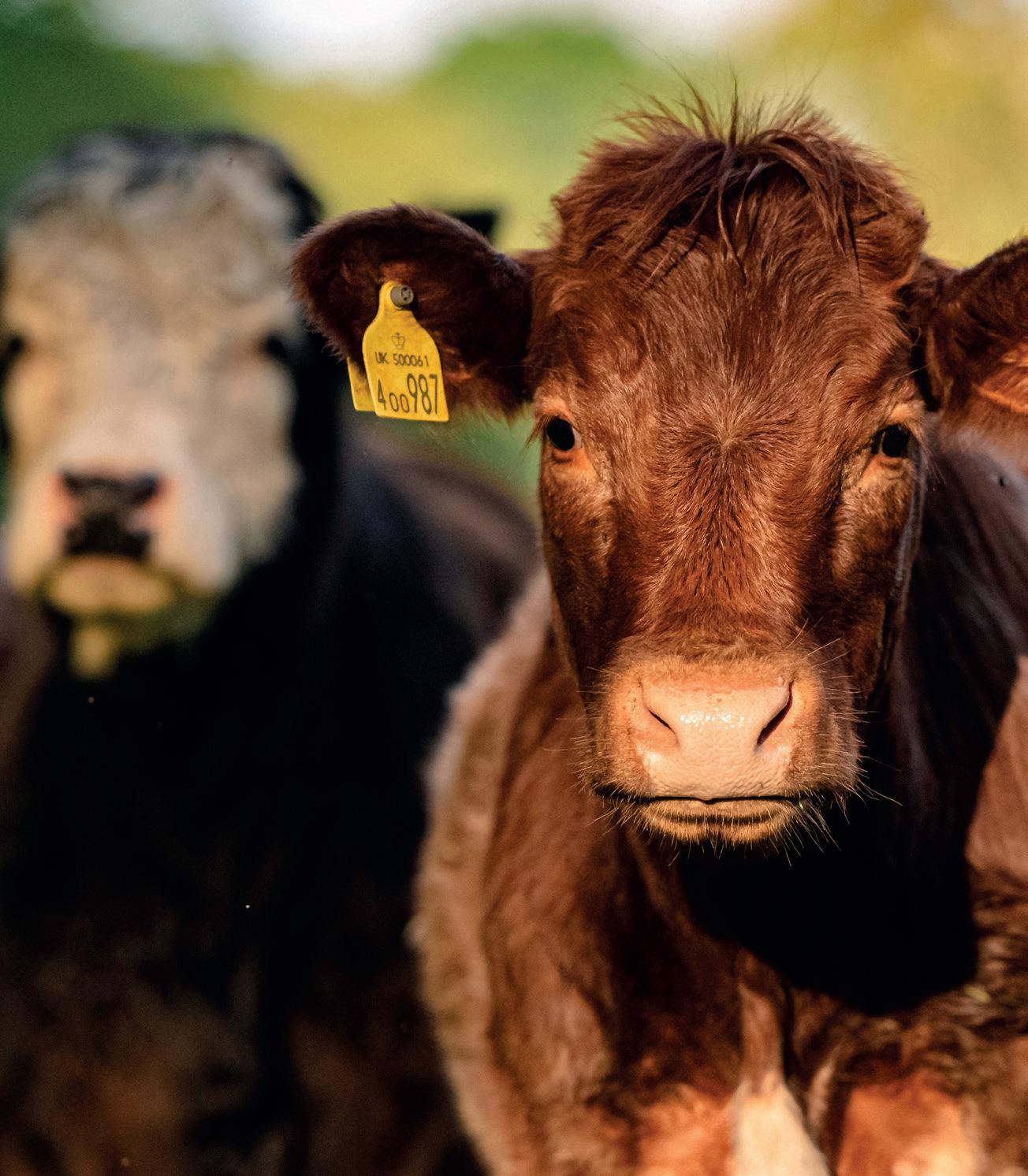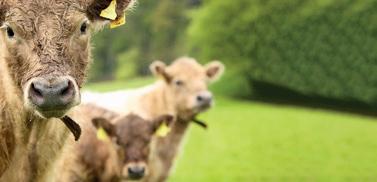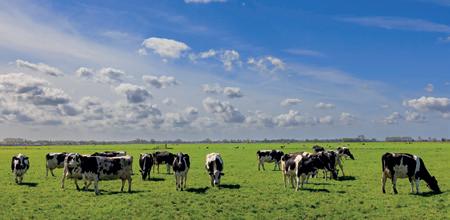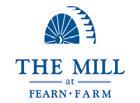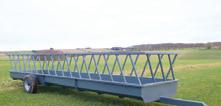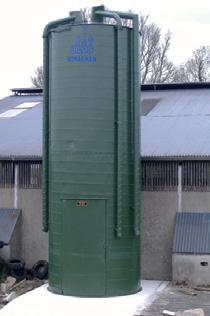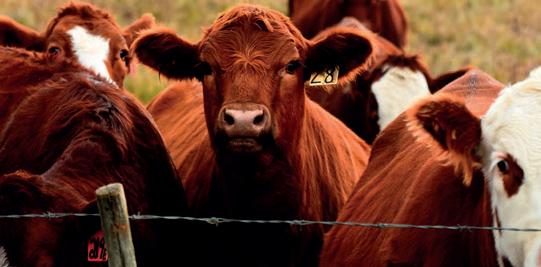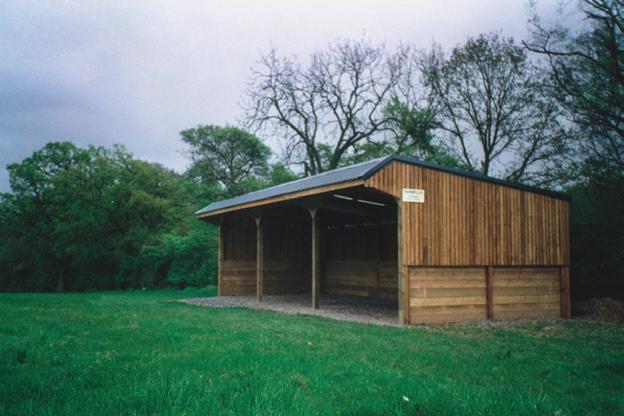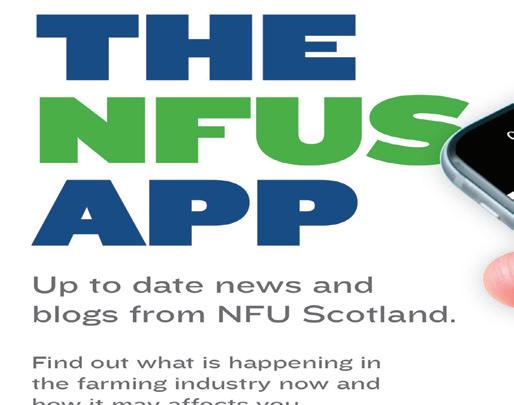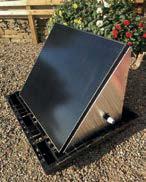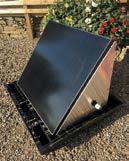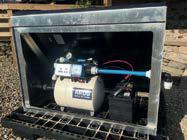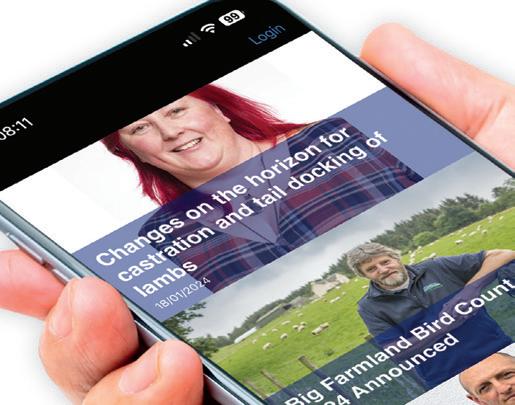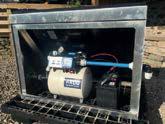

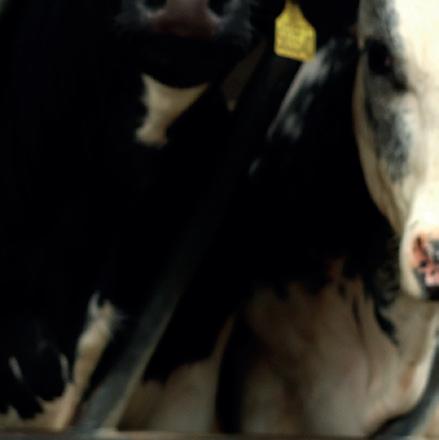
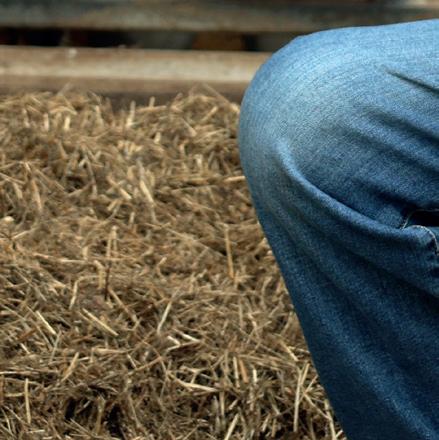







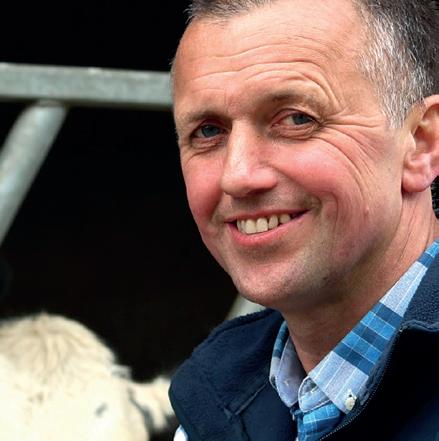
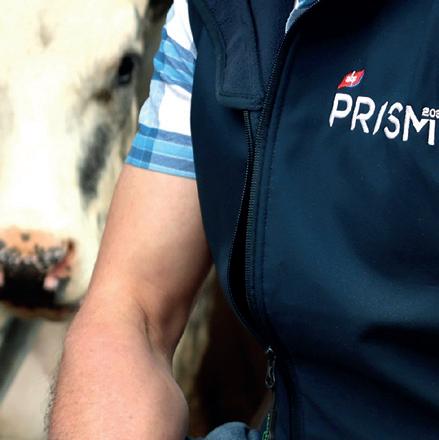
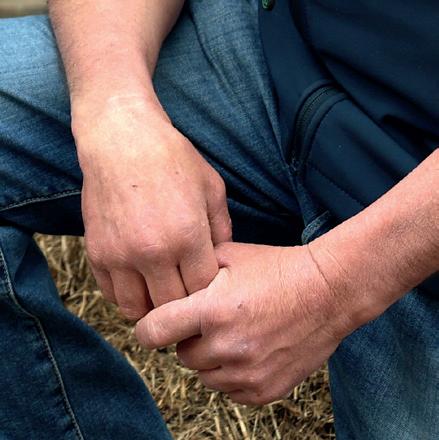


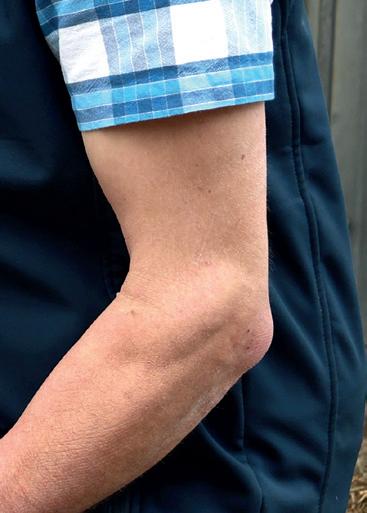

By Fraser Kidd
As someone who works closely with agricultural businesses across Scotland, I’ve seen first-hand how the challenges facing the industry are evolving—and intensifying. Farming today isn’t just about managing land and livestock. It’s about navigating legislation, responding to financial pressures, and making smarter decisions with the data that’s already flowing through your business.
We are seeing more of our clients turning to technology to help overcome these pressures. They’re looking for realtime reporting that’s easily accessible, detailed insights into soil health, livestock performance, irrigation, and fertilizer usage. They’re taking their environmental and sustainability responsibilities seriously—not just because it’s the right thing to do, but because it’s essential for meeting legislative requirements and securing long-term viability.
When I visit farms and agricultural businesses, I hear recurring themes: the need for better stock management, improved traceability, and smarter resource planning. And the pressures aren’t just in the field. Changing tax rules, inheritance planning, and environmental compliance can feel like a second full-time job. As new avenues like agritourism take off, we’re seeing shifts in labour demands and a growing appetite for data-driven technologies that help businesses identify trends and tailor their services to meet changing customer expectations.
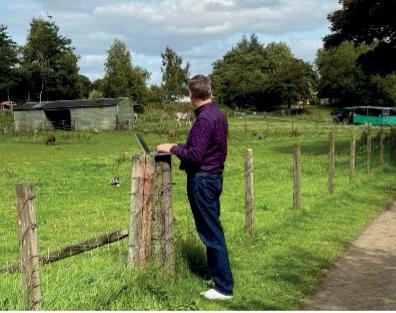
We’ve also seen a rise in software packages—and boltons to existing systems—that are designed specifically for agriculture. These tools can make a real difference, but only when they’re aligned with the business's strategy and
processes. Training and ongoing support are essential to ensure these tools are embedded properly and delivering real value to the business.
Recently, we partnered with a vertical farming organisation to support their anticipated global growth. It was a twophase project that started with a full business review. In Phase 1, we mapped out their end-to-end processes and delivered a detailed report highlighting inefficiencies and areas for improvement. It became clear that their existing systems were outdated and no longer fit for purpose.
Phase 2 focused on selecting a new Enterprise Resource Planning (ERP) system. We ran workshops to gather expectations, define functionality, and collaborate with key personnel to develop a Statement of Requirements and future-state process maps. This resulted in a robust digital platform that now supports their growth and gives them the confidence to scale.
This kind of transformation isn’t just for high-tech vertical farms -every farm is different. Whether you’re running a mixed operation, managing seasonal labour, or navigating succession planning, your data tells a story.
By using cloud-based systems, farmers can access real-time insights from cash flow to crop forecasts—without digging through paperwork or waiting for end-of-year reports and ease the stress of Making Tax Digital. Enterprise Resource Planning (ERP) and Material Requirements Planning (MRP) tools make everyday tasks easier, from ordering feed to scheduling machinery. It’s like having a digital farm manager that never sleeps. And when bottlenecks appear—whether it’s delays in supply, rising costs, or compliance headaches— smart systems help you spot them early and act fast.
“Technology doesn’t replace instinct—it amplifies it.”
We don’t offer off-the-shelf solutions. Every farm, every business, has its own rhythm and its own needs. That’s why we take a tailored approach—reviewing each operation individually and offering support across strategy, leadership, governance, technology evaluation, performance management, and change management. Farming is built on tradition, but it’s also built on resilience. Embracing digital tools doesn’t mean giving up the way you work—it means enhancing it. With the right support, smart farming technology can help you plan better, respond faster, and grow stronger.
Our Digital Advisory Service offers a tailored Technology Health Check designed specifically for agricultural businesses. It helps you assess your current systems, understand how your data is being used, and identify practical steps to improve efficiency, compliance, and profitability. Email if this is of any interest and let’s start with a conversation.


NFU Scotland, Rural Centre, West Mains
Ingliston, Edinburgh EH28 8LT
NFU Scotland, Rural Centre, West Mains Ingliston, Edinburgh EH28 8LT

0131 472 4000


Tel: 0131 472 4000 www.nfus.org.uk nfuscotland @NFUStweets

www.nfus.org.uk nfuscotland @NFUStweets @nfuscotland
Editor editor@nfus.org.uk
Design & Production
HOW often do you see or learn about something and think ‘I’m up for that’, but then never actually realise that
silent commitment? Possibly too often or not at all.
Editor Diana McGowan editor@nfus.org.uk
Mark Shreeve mark.shreeve@micropress.co.uk
Andrew Hirst andrew.hirst@micropress.co.uk
Managing Editor
Craig Gibson
Advertising Sales
Design & Production
Danny Lewis 01502 725862 danny.lewis@micropress.co.uk
Ryan Swinney
Advertising Sales
Lawrence Kenny 01502 725860 lawrence.kenny@micropress.co.uk
Clare Stebbing clare@connect communications.co.uk
Tel: 0131 561 0024
Published on behalf of NFU Scotland by Connect Publications (Scotland) Ltd. Studio 2001, Mile End, 12 Seedhill Road, Paisley PA1 1JS
Published on behalf of NFU Scotland by COUNTRYWIDE PUBLICATIONS
Fountain Way, Reydon Business Park, Reydon, Suffolk IP18 6SZ 01502 725800
Printed by MICROPRESS PRINTERS LTD Fountain Way, Reydon Business Park, Reydon, Suffolk IP18 6SZ 01502 725800
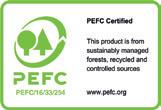

In this month’s magazine, our two features cover inspiring stories and highlight just how rewarding delivering on such thoughts can be both for the individual involved and others who may benefit along the way.
IWe’re only a few weeks away from the Royal Highland Show. Over the course of four days, thousands will flock to the show to compete, judge, exhibit, organise, educate and socialise. We’ll see the best of the best and relish the atmosphere. Among the highlights and away from the main show ring, this year will see the welcome return of the Golden Shears Sheep Shearing and Woolhandling World Championships. Taking place at the MacRobert Theatre, the 2023 Worlds will see more than 30 countries compete for the prestigious title and it promises to be an action packed showcase of the art, skill and techniques required to be a world champion.
Brooke Harwood
t’s hard to believe August marked six months since our Presidential Team took office. It feels like only yesterday that Andrew, Duncan and Robert were elected at our AGM in February. Since then, they’ve been working tirelessly on your behalf, securing parliamentary meetings on key issues such as inheritance tax and touring the country to meet members at summer shows.
Reflecting on these months (pages 46–48), President Andrew Connon told me the past half-year has been “busy, productive, and full of pride”. As he reached this milestone, we spoke about his most memorable moment in the role, his policy priorities and even his favourite dance floor ballad (visit our social channels to find out!)
Also looking back was our first 2025 NFUS Success Report. In a continuation of our Quarterly Success Reports, it charts our progress under the new pillars of Policy Influence, Business Essentials, Your NFUS, What’s On and In The News. Highlights since 1 January include: securing the reallocation of £46 million of unrequired funds to agriculture from the Scottish Government; the rejection of the Climate Change Committee’s proposal to cut livestock numbers; identifying a £500 million opportunity for Scottish agriculture through ShelfWatch; and the Government’s decision to abandon plans for a Galloway National Park. With such a catalogue of lobbying wins, it’s worth asking: where would our industry be without NFU Scotland, its staff and its members? (Read more on pages 8–12).
Perhaps a less well known event taking place at this year’s Highland is the final qualifying round of the 2023 Britain’s Fittest Farmer competition. Taking part in this event for the first time is Kyla Graham from Kirkcudbrightshire. Kyla first spotted the event at the Show last year and while watching it thought ‘I’m up for that’. Kyla knew however she couldn’t just enter there and then. Like any competition, she understood you need to be ready for it and without knowing if she would even enjoy it, she set her mind to it to finding out if she would. Kyla shares her journey from that moment to the present and highlights how she’s benefited already in so many ways both mentally and physically, and explains about the positive impact her preparation has had on her working life.
The other feature looks at how a casual conversation during a Christmas lunch turned into the most rewarding and humbling experience for Next Generation Chair, Matthew Steel, one of the many volunteers who have recently delivered much needed 4x4 vehicles to Ukraine to support the war effort. Matthew explains his contribution to the ‘Pickups for Peace’ campaign and reflects on how the unexpected reception received from the Ukrainians has impacted him and those who were involved.
Moving the focus to the Union’s future success, I’m delighted to welcome our new Communications Manager, Megan Williams, to the role. Ready and excited to develop the magazine further, she will take over the editorial reins from next month as I move to a new role outside NFU Scotland.
With no farming background myself, it has been a joy and privilege to work on behalf of you all. The role has opened my eyes to the true value of Scottish agriculture, its people, its resilience and its irreplaceable role in our future. This industry is a treasure that we all must champion.
Finally, as we head towards the longest day, with the hope of some warmer weather on the horizon, I hope you’re remembering to dress for the weather and wear protective sunscreen and hat when you’re out and about. The strength of the sun even on a dull day can prove harmful if exposed without protection. If you need a new baseball cap, visit the NFU Scotland website and purchase one from the branded merchandise in the Members’ Benefits section.
“We’ll see the best of the best and relish the atmosphere”
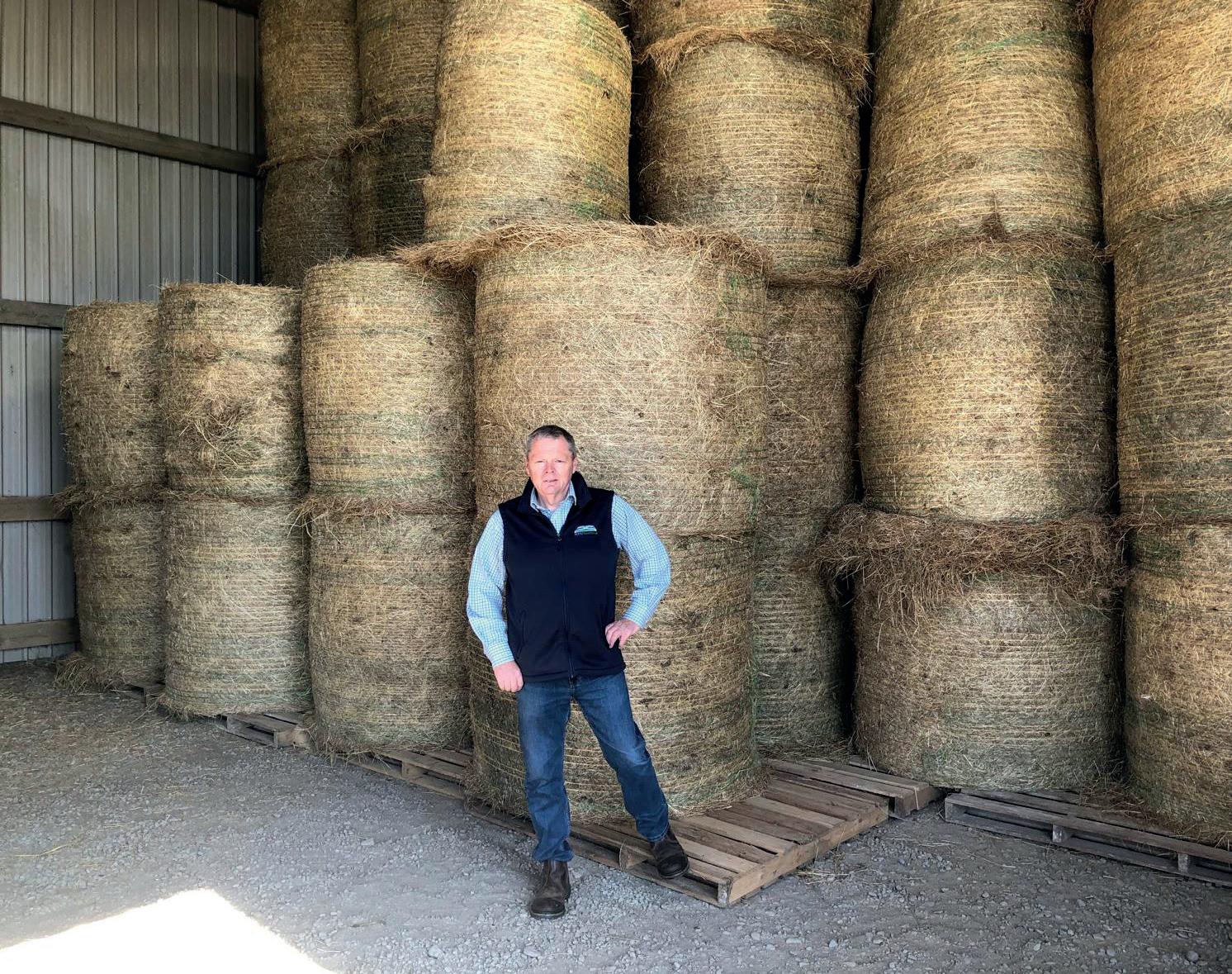
Andrew Connon
As I write this, the summer show season has neared its end. It’s been a tremendous summer of engagement at the shows for the NFUS team. There was nothing better than hearing ideas, thoughts and concerns from members on a variety of topics.
There was no doubt that conversations most frequently centred around proposed changes to inheritance tax (IHT).
“Any movement on IHT?”, “are you knocking any sense into Government on IHT?”, “keep up the pressure” members often said to me at shows.
I told them all that we have continued to apply pressure on Labour MPs in particular, with many conversations and written submissions to them. In addition, we have begun planning another trip to London for Back British Farming Day on 10 September. At this, we intended to engage
with as many MPs as possible in partnership with our counterparts in the other UK Farming Unions.
I have also met with the Environment, Food and Rural
Aff airs Chair Alastair Carmichael MP on several occasions as this committee has a key part to play in infl uencing Government and Labour MPs, in particular. It has been refreshing to see MPs of multiple parties come together on this critical subject impacting the long term future of UK agriculture.
The other main talking point at shows has been dire cereal prices this year, with no doubt that arable margins will break even at best. While we have been hopeful that winter barley and wheat yields will make up for a poor price, a combination of declining demand, dry weather, lower spring barley yields and considerable screenings have turned this harvest into a crisis for many.
As a Union, we have had considerable engagement with the arable supply chain. We recently held industry roundtable
meetings with the Scotch Whisky Association, several maltsters and various merchants, discussing demand, prices, imported grain, standards, equivalence, traceability and provenance. We might be in a global market and receiving better prices per tonne than other parts of the UK and the EU, but surely it’s time to consider provenance and pay more for it.
As August marked six months in the role, I’ve been taking time to refl ect on what we’ve achieved together in that time. Just this last month, my travels have seen many meetings including with Baroness Minette Batters on the Farm Profi tability Review, a farm walk with Dumfries and Newton Stewart branches and the Cabinet Secretary for Rural Aff airs, Land Reform and Islands Mairi Gougeon MSP, on our farm. As the cogs of NFU Scotland keep turning, you can read pages (46-48) for a detailed look on my fi rst six months as president. It continues to be a privilege to represent Scottish agriculture.


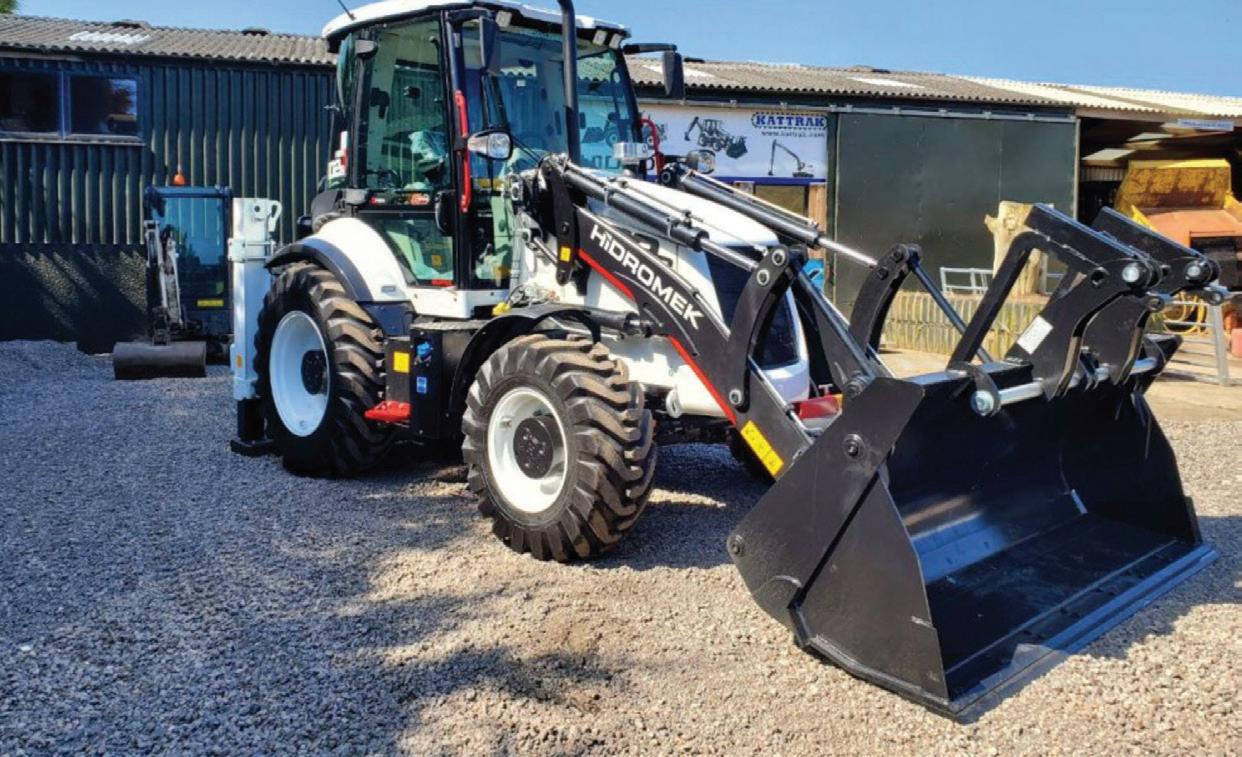








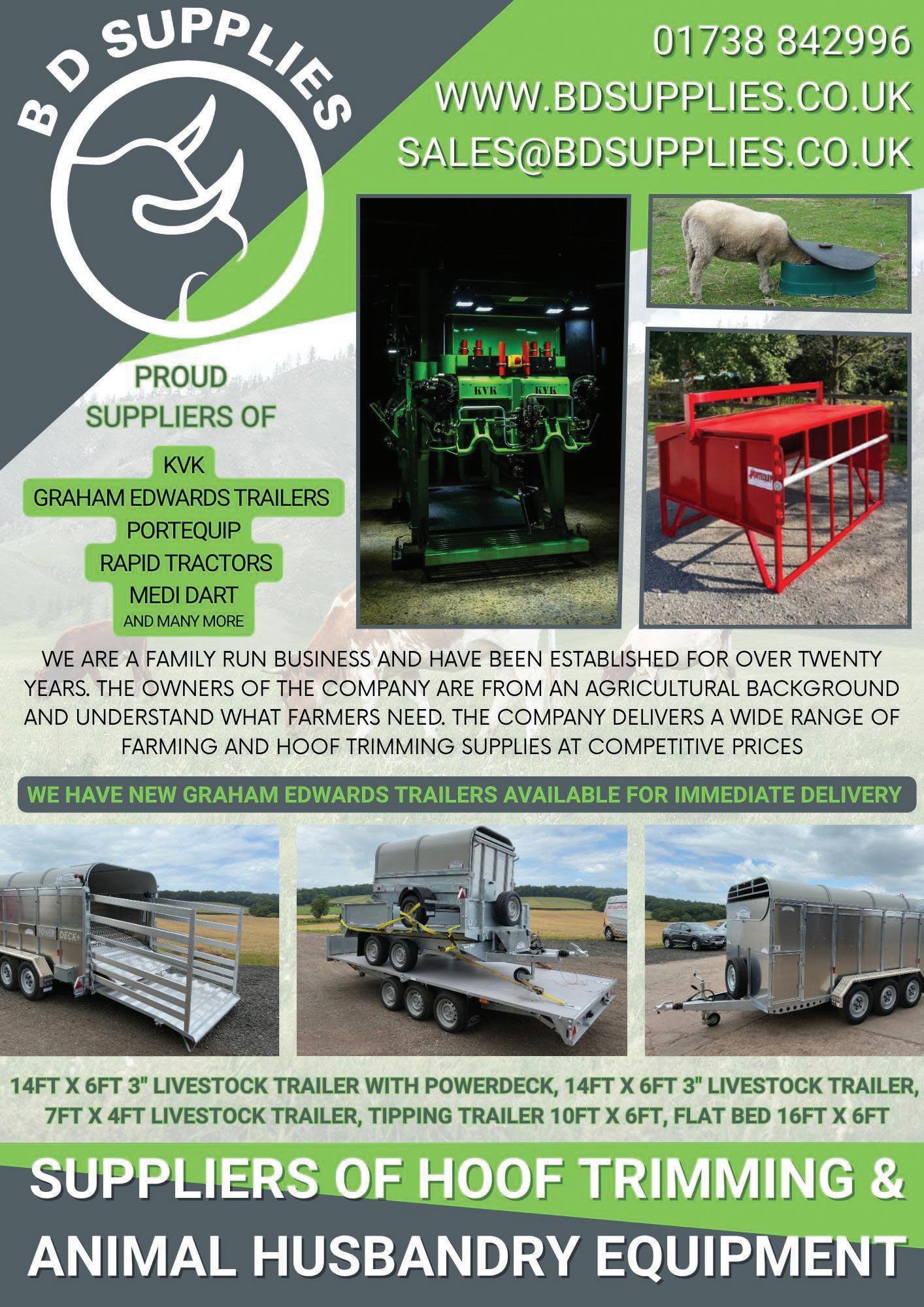

RDuncan Macalister Vice President
ecently, I met with members to discuss the implications of the proposed new Kintore to Tealing overhead powerline, which will cut through some of the more productive land in Scotland. Whilst I fully acknowledged the need for grid upgrades to carry renewable energy from remote areas and off shore sites to towns and cities, the reality is: Scotland has only 15% productive primary land, the type that can grow a variety of crops ready for the table. It’s the kind of land that can produce a carrot you can eat raw. Soil and productive land are fi nite resources, and once lost, they are gone for good. That’s why infrastructure projects should be designed and located

ARobert Neill Vice President
t the time of writing, show season is almost over, with just one last trip to Langholm at the end of September. It’s been a real highlight of the year, not only for the livestock, produce, and community spirit on display, but also because it’s taken me to parts of Scotland I’d never visited before. At each event, I’ve enjoyed speaking with members, hearing what they’ve been working on, and listening to their concerns. Those conversations have been invaluable, reminding me of the diversity and resilience in our community.
Attending different shows has also given me a fresh appreciation for the huge amount of work that goes into
with care, using updated land data and ensuring they do not unnecessarily diminish our capacity to produce food. We need to make sure this kind of infrastructure and agriculture can co-exist in a way that supports the need for electricity and the importance of food security.
As wayleave and servitude notice letters began arriving for the Kintore to Tealing overhead line, as well as others related to this project, I would like to remind members not to sign anything until they are fully informed of the detail. This includes being aware of where the infrastructure is located, its height and how this will impact your business. Our Utilities Helpline, in partnership with Davidson
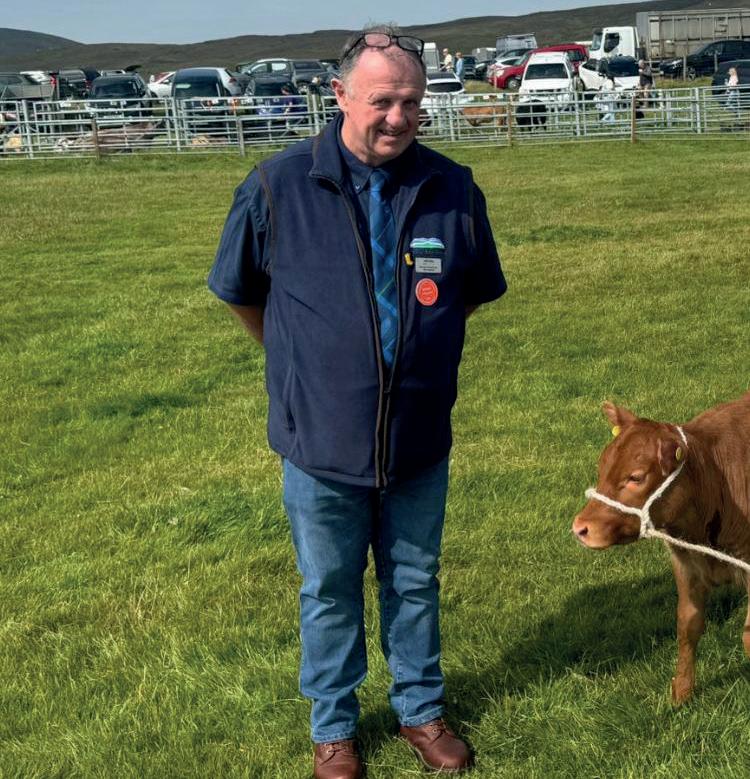
and Robertson, has been dealing with enquiries relating to this project and can be accessed on 0131 609 9717. We also have more detailed guidance on our website, accessible via your
regional managers.
To borrow the words of our Prime Minister: “Food security is national security.” That must remain at the heart of decision-making for every major infrastructure project.
organising them. I was at Turriff Show when organisers made the difficult, but necessary, decision to close early on the second day due to Storm Floris. It was a stark reminder that, in farming and in events, the weather always has the final say.
Over the summer, I’ve been raising concerns with MSPs over the Farming and Food Production Future Policy Group’s (FFIS) scheme. While the application form was straightforward, I felt it didn’t ask for enough detail about the reasoning behind applications. The scheme closed on 22 August, heavily oversubscribed. I’ve asked whether there’s any prospect of increasing the budget to meet the clear demand.
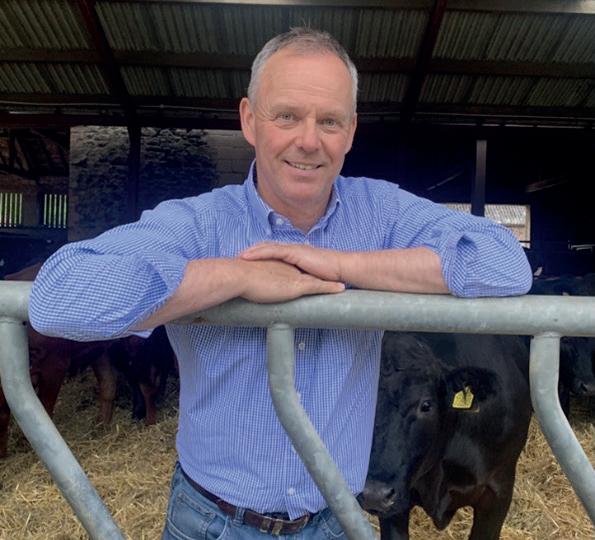
Out in the fields, an earlier-than-usual harvest is now complete, with fodder crops growing well. The focus has shifted to drilling next year’s crops, but changes to Greening rules mean that what was acceptable before may not meet criteria going forward.
Careful preparation now will ensure the right measures are in place.
As the season changes, so too do our priorities but whether in show fields or crop fields, planning, adaptability, and resilience remain essential.
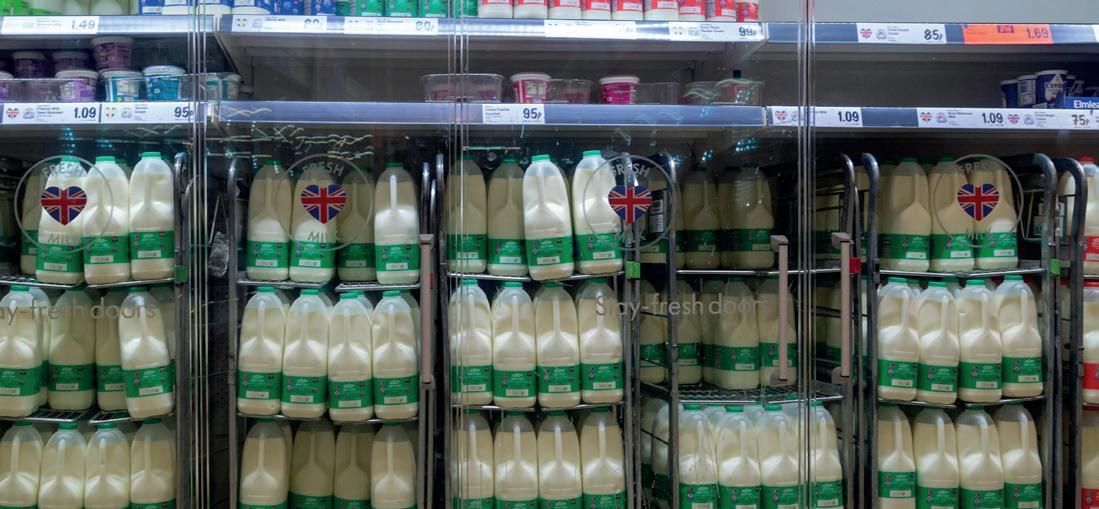
NFU Scotland welcomed Müller UK & Ireland’s announcement of a £45 million investment in its Skelmersdale site, describing it as a positive step for the sector.
The announcement also confirmed contractual changes for Scottish dairy farmers supplying the former Yew Tree site. Following negotiations by Yew Tree producer representatives, the new contract will take effect from 1 November 2025, two months earlier than planned. While the contract represents an improvement for most producers, it is still expected to leave them receiving a price significantly below the national average.
The plight of Scottish dairy farmers on Yew Tree contracts, who endured some of the lowest milk prices in the industry, has been a long-standing concern for NFU Scotland. The Union has consistently raised the alarm over the unsustainable pricing model and the pressures it places on farm viability and farmer wellbeing.
NFU Scotland Milk Committee Chair Bruce Mackie said: “At a time when many milk producers in Scotland have experienced welcome price and market stability, those supplying under Yew Tree contracts have been left behind, struggling to survive on a milk price that is both unprofitable and unsustainable.
“The average milk price in Scotland hides a stark inequality. The gap between the highest and lowest-paid producers is now over 16p per litre, with Yew Tree
suppliers persistently anchored at the bottom. This is unacceptable and has pushed several businesses to the brink, both financially and mentally.
While Müller’s planned investment at Skelmersdale and the introduction of revised contracts from November represent steps in the right direction, the timeline offers little immediate relief to those already under immense strain. We welcome progress but stress that urgent interim price increases should be considered.”
is disappointing.
“Yew Tree suppliers are family farming businesses currently on the bottom rung that deserve to hear vision and ambition from Müller UK & Ireland on their route to a profitable milk price. It is in all our interests that all producer suppliers are confident of a future in milking cows and I would wish to discuss with Müller UK & Ireland its plans to engage constructively and work with the sector to build a sustainable future for Scottish dairy.
“Scottish farms offer processors like Müller UK & Ireland strategic advantages
The average milk price in Scotland hides a stark inequality. The gap between the highest and lowest-paid producers is now over 16p per litre, with Yew Tree suppliers persistently anchored at the bottom. This is unacceptable and has pushed several businesses to the brink, both financially and mentally.
NFU Scotland President Andrew Connon, who wrote directly to Müller’s UK CEO in June seeking a meeting on this matter, added: “We’ve made it clear to Müller that change is needed, not only to support Scottish Yew Tree suppliers but to provide clarity on the company’s future commitment to its Scottish milk field. To date, we have received no reply to our letter or request for dialogue. That silence
in climate resilience and biosecurity, especially during prolonged drought and climate instability. These contributions to national food security must be recognised more directly in the milk cheque.”
With the new Fair Dealing legislation on milk contracts now in place, NFU Scotland is urging major processors like Müller to show leadership by offering fair contracts to all farmer suppliers.
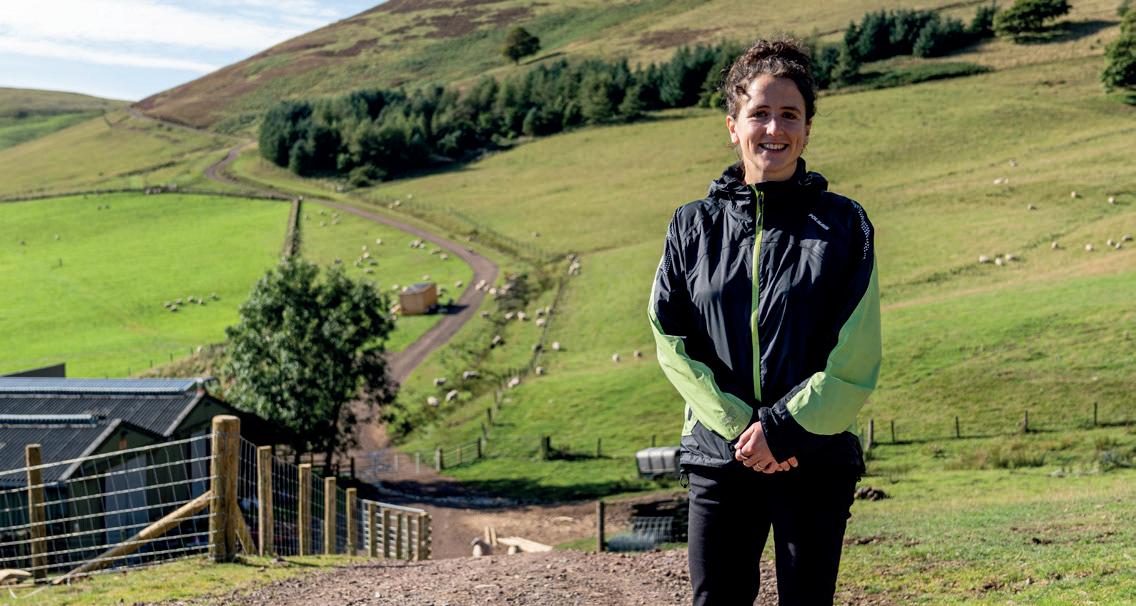
The Scottish Government has confirmed it will not proceed with the designation of a new National Park in southwest Scotland. The decision, announced on 29 May 2025, followed NatureScot’s formal advice and an extensive consultation process.
NatureScot’s input came in two parts: as Reporter, it advised that a new park should not go ahead, reflecting the significant level of public opposition. However, as natural heritage adviser, it highlighted potential environmental and climate benefits from such a designation. This conflicting advice caused some confusion for stakeholders, but NatureScot’s role is strictly advisory, the final decision lay with Government.
The Cabinet Secretary’s statement brought the matter to a close for now, but NFU Scotland recognises the high-profile
nature of the debate and the likelihood it could resurface in future political discussions, particularly as parties prepare their manifestos ahead of the 2026 Scottish Parliament elections.
NFU Scotland has consistently opposed the creation of any new National Park in Scotland since at least 2021. A public survey undertaken by NFUS in 2024, involving almost 2,000 respondents, found 73% opposed a National Park in Galloway. This, along with follow-up member feedback, underpinned our formal opposition during the consultation.
NFUS engaged extensively with members, NatureScot, the Scottish Government and other stakeholders throughout the process, ensuring the voice of farming and rural businesses was heard. While the Scottish Government’s

decision was welcomed, NFUS has continued to monitor the political landscape and restate its position in discussions with potential MSPs during the run-up to the 2026 election. The Union has remained committed to working in partnership with local organisations to meet environmental and rural development goals through means other than National Park designation.
This has included:
• Organising our third Future Farming Conference with the Galloway and Southern Ayrshire Biosphere (GSAB) and Propagate.
• Hosting a Dumfries & Galloway meeting with Peatland ACTION, including sessions on muirburn and fire safety with the Scottish Fire and Rescue Service.
• Supporting members engaging with Whole Farm Plan requirements, with many already ahead on carbon audits due to supply chain commitments.
• Involving expert partners such as the Crichton Carbon Centre at local branch meetings.
• Encouraging collaboration with tourism bodies, including Scottish Agritourism and the South of Scotland Destination Alliance.
Our focus has remained clear: we must protect the future of Scottish food production and agriculture’s role in our rural communities.

For a limited time only, you could save up to 100% on your 2026 NFU Scotland membership fees. Launched in May, our Member Referral Scheme offers a 10% 2026 fee discount to existing members that refer a successful new member.
Refer 10 new members? Pay nothing next year. We want to empower members to grow our Union - and get rewarded for it. With more voices, our collective lobbying efforts are strengthened in Holyrood, Westminster, the media and beyond.
How to refer:
1. Speak to your prospective member – tell them about the benefits of joining NFU Scotland and encourage them to sign up.
2. When they’re ready to join, complete the application form at joinnfus.org.uk, including your name and membership number.
3. Alternatively, the new member can sign-up themselves at joinnfus.org.uk. Make sure they enter your name and membership number during the signup process to make sure you get the credit.
The deadline for referrals is 15 October 2025. All successful referrals will be verified and matched before final 2026 fees are issued.
Let’s unite to shape the future of Scottish agriculture and make sure your neighbours, friends and colleagues are part of it.
Scan the QR Code or visit joinnfus.org.uk to start referring today.





NFU Scotland has voiced alarm at the European Commission’s latest budget proposal which saw major agricultural cuts in Europe. The Union warned that similar moves across the UK highlight the need to protect Scotland’s distinct agricultural support model.
President Andrew Connon said: “The EU’s new budget proposal is sobering. At a time when the overall EU budget is increasing, a near 25% cut to the Common Agricultural Policy (CAP), alongside the dismantling of its core direct support structure, is staggering. Farmers and crofters across Europe are being asked to deliver more with far less.
“It’s not just an EU issue. In Wales, the new Sustainable Farming Scheme will slash Basic Payment by 40% in 2026. In England, direct support will disappear entirely by 2027, replaced by the much-criticised Sustainable Farming Incentive and fragmented grant schemes.
“A similar scenario in Scotland would be catastrophic, a cliff edge many farms and crofts would not survive.”
He pointed to worrying










parallels elsewhere in the UK. In Wales, the Sustainable Farming Scheme will cut Basic Payment by 40% in 2026, while in England direct support will end completely by 2027, replaced by the muchcriticised Sustainable Farming Incentive and fragmented grants.
NFU Scotland stressed the importance of the commitments it has secured from successive First Ministers to retain at least 70% of future funding as direct support, with most channelled through Tier 1 Base Payments.
“That stability underpins our ability to produce high-quality food, deliver on climate and biodiversity goals, and sustain rural livelihoods,” Connon said.
NFU Scotland warned that the current direction of travel in other parts of the UK and Europe presents a cautionary tale and reaffi rmed its commitment to securing a bespoke and stable agricultural policy for Scotland.
“Scotland must chart its own path and it is essential that all political parties in Scotland, in the run-up to the next election, commit to maintaining and increasing a multi-year agricultural budget that gives our sector long-term security,” Connon concluded.
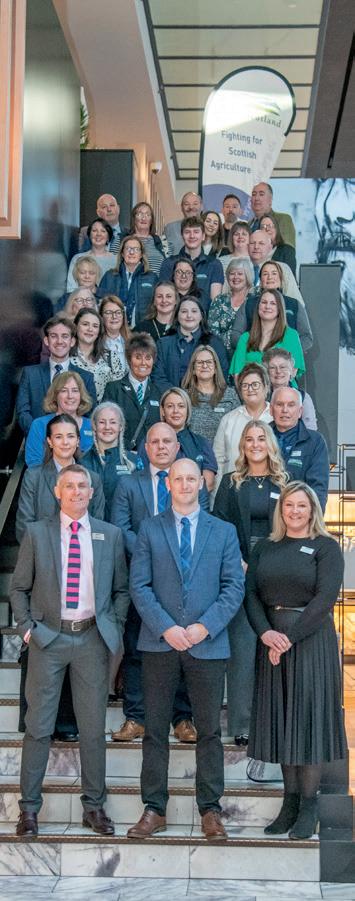
NFU Scotland has published its 2025 NFUS Success Report capturing key achievements from the first half of the year.
Charting a string of major wins for Scottish farmers and crofters in policy, political engagement, member services and events, it demonstrated the real-world impact of the Union’s work on member behalf. Highlights included securing £46 million in reinstated agricultural funding, shaping retailer support for Scottish produce through the ShelfWatch campaign, informing NatureScot’s Galloway National Park consultation, and defending Scottish livestock production against Scottish Parliament’s Climate Change Committee’s advice to cut herd numbers.
NFUS President Andrew Connon said the results show what can be achieved through strong, coordinated lobbying and member engagement: “Every success in this report reflects the combined effort of our staff, elected representatives and members across Scotland. Together, we’ve delivered meaningful change and protected the interests of farming and crofting at the highest levels.”
The report has also detailed NFUS’s growing media presence, with stories on key campaigns and policy wins reaching national audiences as well as continued progress in building member services and engagement opportunities.
Mr Connon added: “Our mission is to ensure Scottish agriculture has a profitable


At face value, the recently announced trade deal between the UK and India may, over time, be good news for Scottish distillers. However, there are likely to be fewer benefi ts and potential threats for our dairy sector writes NFU Scotland Milk Committee Chair Bruce Mackie.
We would recognise that a vibrant agricultural sector is probably the bedrock of any developing country and milk plays a significant role in human nutrition across all economies. India has the most dairy cows in the world and there are cultural and religious reasons around this. In 2023, the Indian cattle herd of 307.5 million head composed of some 194.2 million head of bovine dairy cattle of which 61 million were in milk and 113.3 million water buffaloes. However, the average yield per cow in India of under 6.5 litres per day compares with 30 litres per day for cows in recorded Holstein herds in the UK. That implies a huge carbon foot print per kilo of milk. Through this deal, the UK not only risks exporting its carbon footprint but significantly increasing it.
and sustainable future. This report is evidence of the impact we can make when we work together and there’s much more still to come this year.”
Members can view the full report online now and see the difference NFU Scotland has been making across the sector.

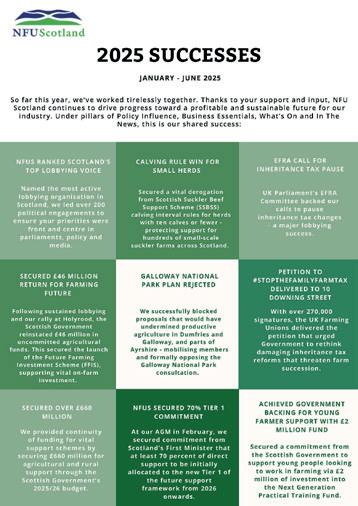

Read the 2025 Success Report here: www.nfus.org.uk/quarter-reports.aspx
In reality, UK dairy farmers and our dairy sector should be exporting nutrient rich, sustainably produced dairy goods to India to support the country both nutritionally and in helping reduce its carbon footprint.
Unfortunately, there are no reductions on tariff s for our dairy exports to India while its dairy imports will come here tariff free. From a dairy perspective, this is a case of disappointingly poor negotiation by the UK Government.
The Indian dairy sector is hugely ambitious. While, under Sanitary and Phytosanitary requirements, Indian dairy goods would currently struggle to meet UK standards, its intention to become a major exporter of dairy products is well known. Under the terms of this agreement, that dairy produce could have tariff-free access to the UK in the future. That is a serious concern for the sector.


NFU Scotland members have saved a staggering £127,000 collectively this year thanks to the NFU Scotland fuel card scheme. The exclusive member benefit, delivered in partnership with UK Fuels, allows members to save on fuel at an average of 15 pence per litre (ppl) on diesel. Calculating this standardised data, participating members have been saving around £550 annually which has been a significant boost for rural businesses facing ever-rising input costs.
With no contracts, account fees or card charges, the scheme has been designed to be simple, flexible and accessible for everyone with an NFUS membership. Fuel cards can be used at thousands of sites across the UK, providing convenience as well as cost savings.
NFUS Vice President Duncan Macalister said the value was clear and has been advocating for the card since its introduction in February. He said: “It’s a no-brainer! The savings are brilliant. Every penny’s a prisoner and this is a real win for our members.”
For those not yet signed up, an online interest form has been designed to make getting started as quick and easy as possible. To join the hundreds of members already benefiting, complete the quick form at: www.ukfuels.co.uk/ nfu-scotland


Words by Animal Health Policy Manager Penny Middleton
In January 2024, I wrote a piece highlighting the pressure placed on Government by the 2022 Animal Welfare Committee (AWC) report on tail docking and castration in sheep. The AWC report heavily criticised government and industry for the lack of progress made on reducing the reliance on tail docking and castration, increased use of anesthetic and pain relief or research into alternative more humane methods. AWC have asked for progress in their two previous reports 1994 and 2008 and their 2024 report appears to really draw a line in the sand, and it will be extremely difficult for any of the UK administrations not to make changes.
Scottish Government are expected to consult later this year on proposals to ban castration and tail docking in sheep of any age, unless appropriate pain relief is administered or a method used that effectively and immediately prevents pain responses. NFUS is clear that any ban on using rubber rings as they are currently used, i.e. without pain relief, will be very difficult for the sector with no alternatives available that can match the convenience and low cost of a rubber ring.
There are currently two alternatives available for use in Scotland; Numnuts or Clip Fitter that are considered to minimise pain during castration.
• The Numnuts system is based on traditional rubber rings but also delivers an anesthetic injection at the point of application.
• Clip Fitter applies a clip to the scrotum or tail which has a Burdizzo type effect crushing the nerves at point of application, stopping sensation of pain.
We are pushing Scottish Government to support the development of better alternatives and the need for a long lead in time for change, to allow the development of better alternatives, but the writing is clearly on the wall and change inevitable. We have highlighted that although it is good to see more humane methods of castration now available, the current cost of these systems is considerably higher than rubber rings and demonstrates the need to support the sector to transition to these higher cost alternatives. We are therefore pleased to see support available through the new Future Farm Investment Scheme (FFIS) for the purchase of castration and tail docking devices that minimise pain and we urge members to take advantage of this support whilst it is available as it may become mandatory either by regulation or retailer requirement in the future.
The Scottish Government has announced its Wildlife Management and Muirburn (Scotland) Act 2024 will come into force from 1 January 2026. This will make it an off ence to carry out muirburn without a licence anywhere in Scotland from then.
The controlled burning of old heather and vegetation on moorland has been a key land management practice for centuries, helping reduce wildfi re risk, improve grazing, support

biodiversity and protect peatland health for carbon capture.
NFU Scotland has warned that while responsible regulation is important, a poorly designed or overly burdensome licensing system could backfi re, discouraging planned burns and
increasing the risk of uncontrolled, high-intensity wildfi res.
NFUS has continued to push for a licensing framework that balances environmental protection, wildfi re prevention and the needs of l and managers.
Mutual
NFU Mutual hails the work of FareShare, who are supported by Southern
NFU Mutual and Environmental Farmers Group unite to help farmers manage the risks of devoting
NFU Mutual hails the work of FareShare, who are supported by Southern England Farms
KWWWWhile many people look forward to traditional festive fare at this time of year, others are unable to afford the most basic food for themselves, families.
hile many people look forward to traditional festive fare at this time of year, others are unable to afford even the most basic food for themselves, and their families.
hile many people look forward to traditional festive fare at this time of year, others are unable to afford even the most basic food for themselves, and their families.
Learn how to make your money work best for you with advice from NFU Mutual on investing wisely and understanding your allowances
hilst farming in a way that benefits the environment is not new to the sector, Natural Capital markets are a rapidly emerging framework that allow landowners and farmers to assign value to natural assets— such as land, water, and biodiversity—by enhancing them through nature-based interventions. These interventions deliver ecosystem services, which can be measured, verified, and monetised through regulated or voluntary markets.
The cost-of-living crisis – and rising of even basic foods – has made it more difficult for many people a meal on the table this year. In more than 13 million people in face food insecurity, according FareShare, the UK’s biggest charity hunger and food waste.
The cost-of-living crisis – and rising cost of even basic foods – has made it even more difficult for many people to put a meal on the table this year. In fact, more than 13 million people in the UK face food insecurity, according to FareShare, the UK’s biggest charity fighting hunger and food waste.
The cost-of-living crisis – and rising cost of even basic foods – has made it even more difficult for many people to put a meal on the table this year. In fact, more than 13 million people in the UK face food insecurity, according to FareShare, the UK’s biggest charity fighting hunger and food waste.
eeping all of your money in cash savings accounts may seem like a safe option. But you may miss out on the potential to grow your money, particularly if interest rates don’t keep up with inflation. Now could be a good time to reconsider how and where to keep your money, and understanding your allowances can be helpful.

Top up your pension
WThe current tax year ends on 5 April 2024. Here are some things for you to consider:
At same time, every year, more three million tonnes of good-to-eat, surplus food goes to waste on UK farms. That’s enough for seven billion meals, according to FareShare, which takes good-to-eat surplus food from across the industry, sorts it and passes it onto network of nearly 8,500 charities and community groups across the UK. 2022-2023, the charity redistributed tonnes of food: enough to make 128m meals, or four meals every second.
At the same time, every year, more than three million tonnes of good-to-eat, surplus food goes to waste on UK farms. That’s enough for seven billion meals, according to FareShare, which takes good-to-eat surplus food from across the food industry, sorts it and passes it onto a network of nearly 8,500 charities and community groups across the UK.
At the same time, every year, more than three million tonnes of good-to-eat, surplus food goes to waste on UK farms. That’s enough for seven billion meals, according to FareShare, which takes good-to-eat surplus food from across the food industry, sorts it and passes it onto a network of nearly 8,500 charities and community groups across the UK.
With government initiatives like the 25-Year Environment Plan, Scotland’s first National Peatland Plan, and the introduction of schemes like Nature Restoration Fund and the Peatland ACTION Scotland, and Natural Capital markets like the Woodland Carbon Code (WCC), and the Peatland Carbon Code (PCC), the focus on environmental improvement has intensified. In 2021, the UK’s ecosystem services were valued at approximately £1.54 trillion—a 3% increase since 2017—highlighting the growing importance of this space.
is baselining—establishing a clear environmental starting point to measure improvements over time. While essential, this process, along with the initial setup of a Natural Capital project, often requires significant upfront investment.
Talk to an NFU Mutual Financial Adviser. Together we’ll review your financial situation and help you to understand your options.
voluntary, and future compliance markets, driving positive landscapelevel environmental impacts and optimising financial returns from natural capital by harnessing scale and member cooperation.
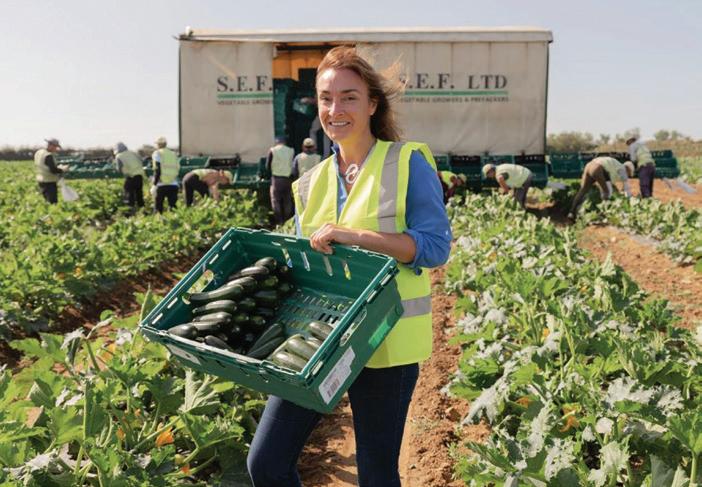
Three key types of Natural Capital projects in the UK are:
community support initiatives, visit www. nfumutual.co.uk/ fightfoodpoverty/or scan the below QR code with a smart phone
To learn more about community support initiatives, visit www. nfumutual.co.uk/ fightfoodpoverty/or scan the below QR code with a smart phone
ith climate change driving hotter and more extreme weather, it’s no wonder that research conducted by NFU Mutual shows that heat stress in cattle is becoming a bigger consideration for farmers.
In 2022-2023, the charity redistributed 54,000 tonnes of food: enough to make 128m meals, or four meals every second. At NFU Mutual, we see it as part of our role to make positive impacts on the welfare of those working and living in rural communities in the UK, and we are only too aware of the growing impact of food poverty in rural communities.
• Reduced milk yields from cows.
when you make the gift. Inheritance tax planning is not regulated by the Financial Conduct Authority.
NFU Mutual and our community support initiatives, visit www. nfumutual.co.uk/ fightfoodpoverty/or scan the below QR code with a smart phone
Heat stress can have a major impact on farm businesses but you can protect dairy cattle.
NFU Mutual, we see it as part of our to make positive impacts on the welfare of those working and living in communities in the UK, and we are only too aware of the growing impact of poverty in rural communities.
But what is heat stress and why is it a problem?
NFU Mutual research shows that 22% of its farming customers and 90% of insured estates are already involved in Natural Capital initiatives. Many are dedicating 10–20% of their land to such projects— often without adequate risk protection.
In 2022-2023, the charity redistributed 54,000 tonnes of food: enough to make 128m meals, or four meals every second. At NFU Mutual, we see it as part of our role to make positive impacts on the welfare of those working and living in rural communities in the UK, and we are only too aware of the growing impact of food poverty in rural communities.
Putting money into a pension is one of the most tax-efficient ways to invest for the long term. The government helps you invest – for every £80 you pay into your pension, HMRC currently pays an extra £20 tax relief making your actual contribution worth £100. In a pension, any growth is free from UK Income Tax and Capital Gains Tax. There are however rules on the amount you can contribute to your pension each year and still receive tax relief.
As farmers know all too well, this surplus food will often end up getting ploughed back into the ground, used for animal feed or sent to landfill.
You can invest up to £2,880 per child each tax year into a pension and HMRC will top this up with a further £720 to give a total of £3,600. This is a long-term investment, designed to give children a head start.
As farmers know all too well, this surplus food will often end up getting ploughed back into the ground, used for animal feed or sent to landfill.
She adds:
She adds:
Capital Gains Tax
● Biodiversity Projects – e.g., habitat creation, rewilding, species recovery, often linked to Biodiversity Net Gain.
As farmers know all too well, this surplus food will often end up getting ploughed back into the ground, used for animal feed or sent to landfill.
• Reduced farm income, putting pressure on fine margins and profitability.
ISA nest egg
• Provide suitable access to water troughs, ensuring they are in good working order.
But the Surplus with Purpose scheme avoids thousands of tonnes of surplus fresh fruit and vegetables, meat and dairy products being wasted. Even cupboard items, and chilled and frozen foods, find a new home as part of the scheme.
But the Surplus with Purpose scheme avoids thousands of tonnes of surplus fresh fruit and vegetables, meat and dairy products being wasted. Even cupboard items, and chilled and frozen foods, find a new home as part of the scheme.
But the Surplus with Purpose scheme avoids thousands of tonnes of surplus fresh fruit and vegetables, meat and dairy products being wasted. Even cupboard items, and chilled and frozen foods, find a new home as part of the scheme.
● Carbon Projects – e.g., woodland creation, peatland restoration, soil carbon capture, linked to Woodland Carbon Code, Peatland Carbon Code, and voluntary carbon market.
• Health-related issues such as increased risk of disease, lameness and reduced fertility. There is also evidence to suggest that it affects the unborn calf and their subsequent performance.
Rob Shepherd, EFG Chairman, said; “This exciting new partnership between the Environmental Farmers Group and NFU Mutual brings together two organisations with much in common. As a co-operative and a mutual respectively, we share core values of collaboration, trust, and community. We’re looking forward to working together to help our members understand and maximise the potential of their Natural Capital.”

Things you should know:
This is why our NFU Mutual Charitable Trust – which exists to promote and support charities working in agriculture, rural development and insurance – is proud to support FareShare’s fight against food poverty. Since 2021, the NFU Mutual Charitable Trust has donated a total of £250,000 to the charity.
This is why our NFU Mutual Charitable – which exists to promote and charities working in agriculture, development and insurance – is to support FareShare’s fight against poverty. Since 2021, the NFU Mutual Charitable Trust has donated a total of to the charity.
This is why our NFU Mutual Charitable Trust – which exists to promote and support charities working in agriculture, rural development and insurance – is proud to support FareShare’s fight against food poverty. Since 2021, the NFU Mutual Charitable Trust has donated a total of £250,000 to the charity.
Heat stress occurs when cows retain more heat than they can release, affecting both indoor and outdoor herds.
● Nutrient Neutrality Projects – e.g., improving water quality and natural flood management.
At its core, Natural Capital is about enabling farmers to generate income from environmentally beneficial activities carried out on their land. By intervening naturally and enhancing natural assets, farmers can deliver ecosystem services that hold measurable environmental and economic value.
The cause is due to a rise in environmental temperatures and humidity and an increase in the cow’s heat production associated with increasing milk yields. To monitor heat stress levels, the industry uses the Temperature Humidity Index (THI) which indicates how severe the condition could be and suggests that action needs to be taken.
You can invest up to £20,000 this tax year in an ISA, building up a nest egg free of UK Income tax and Capital Gains tax. The same tax benefits are available with Junior ISAs, which you can use to build up a pot of money for a child – they’ll be able to access that when they’re 18 years old. The maximum Junior ISA contribution is £9,000 in the 2023/4 tax year.
Furthermore, farmers tell us they’re not always aware of the extent of the financial losses they’re suffering from heat stress in cattle.
Farmers’ greatest perceived risk is uncertainty about the future of natural capital markets and uncertainty around what safeguards exist to manage potential losses.
Key actions you can take
Putting money aside for children can also help reduce your potential Inheritance Tax bill.
How farms are donating their surplus for good and rural businesses throughout are also doing their bit to help. can participate through FareShare’s Surplus with Purpose scheme, which businesses to cover the extra costs redistributing their unsold food to people who need it most.
How farms are donating their surplus for good Farms and rural businesses throughout the UK are also doing their bit to help. They can participate through FareShare’s Surplus with Purpose scheme, which helps businesses to cover the extra costs of redistributing their unsold food to people who need it most.
How farms are donating their surplus for good Farms and rural businesses throughout the UK are also doing their bit to help. They can participate through FareShare’s Surplus with Purpose scheme, which helps businesses to cover the extra costs of redistributing their unsold food to people who need it most.
For example, establishing a woodland sequesters carbon, where an ecosystem service is delivered, can be measured and converted into credits and sold via a Natural Capital market. However, credibility hinges on the principle of additionality—only new and additional, not existing, environmental activities can be monetised. Equally important
In recent years industry studies have highlighted the condition and the impact it can have on farm businesses. It’s generally acknowledged that heat stress can result in:
Once you reach 55 (57 from 2028), you can take money from your pension as you wish. The first 25% will normally be tax-free, any amount over and above is added to your other income and taxed. So withdrawing lump sums from your pension could push you into a higher Income Tax bracket. Spreading withdrawals over a number of tax years could help reduce the impact of any tax liabilities. There’s also a limit on the annual pension contributions you and your employer can make if you’ve already taken a taxable withdrawal from your pension. This could mean you miss out on valuable employer pension contributions in addition to your own.
Don’t forget Inheritance Tax planning
It’s wise to take a long-term view on inheritance planning, so that your heirs don’t pay more tax than they need to.
One grower making the most of the opportunity presented by the scheme is Southern England Farms, based in Hayle, West Cornwall. The business works over 6,500 acres and is a key supplier to several major UK retailers, including a number of supermarkets, of Cornish-grown courgettes, cauliflower, broccoli, spring greens, sweetheart and savoy cabbage. Co-owner Jane Richards, along with her 400-plus pickers, works with FareShare to ensure any excess vegetables never go to waste. Since 2019, they have donated 396 tonnes of excess produce to the charity.
One grower making the most of the opportunity presented by the scheme is Southern England Farms, based in Hayle, West Cornwall. The business works over 6,500 acres and is a key supplier to several major UK retailers, including a number of supermarkets, of Cornish-grown courgettes, cauliflower, broccoli, spring greens, sweetheart and savoy cabbage. Co-owner Jane Richards, along with her 400-plus pickers, works with FareShare to ensure any excess vegetables never go to waste. Since 2019, they have donated 396 tonnes of excess produce to the charity.
One grower making the most of the opportunity presented by the scheme is Southern England Farms, based in Hayle, West Cornwall. The business works over 6,500 acres and is a key supplier to several major UK retailers, including a number of supermarkets, of Cornish-grown courgettes, cauliflower, broccoli, spring greens, sweetheart and savoy cabbage. Co-owner Jane Richards, along with her 400-plus pickers, works with FareShare to ensure any excess vegetables never go to waste. Since 2019, they have donated 396 tonnes of excess produce to the charity.
Recognising the need for support, NFU Mutual has partnered with the Environmental Farmers Group (EFG) to help farmers manage the risks of devoting land to environmental and regenerative schemes within natural capital markets.
Our latest research has found that just over four in ten (41%) say that heat stress is a priority risk for their business while 70% are yet to take further steps to reduce the risk. *
Should you suspect heat stress with your dairy cattle this summer, Dr Tom Chamberlain** highlights some of the key actions that you can undertake to reduce heat stress whilst cows are grazing:
*Source: NFU Mutual Research with Dairy Farms and Dairies, August 2021
One way of doing this is to make gifts to your loved ones, taking advantage of the annual £3,000 gift allowance, or the ‘gifts out of normal expenditure’ exemption. Larger gifts can also be exempt from Inheritance Tax as long as you live more than seven years from
One of the leading groups on Natural Capital in the UK, EFG, is a farmerowned co-operative. It works with rural organisations including Natural Capital Advisory and the Game and Wildlife Conservation Trust, to shape regulated,
Jane says: “No farmer ever wants to see their produce go to waste. But sometimes circumstances mean there is a surplus that will often go into the waste trailer or simply become compost.”
Jane says: “No farmer ever wants to see their produce go to waste. But sometimes circumstances mean there is a surplus that will often go into the waste trailer or simply become compost.”
Jane says: “No farmer ever wants to see their produce go to waste. But sometimes circumstances mean there is a surplus that will often go into the waste trailer or simply become compost.”
“The scheme with FareShare is a brilliant way of ensuring excess produce is redistributed to those who really need it. It is so very rewarding when we find out how many meals our surplus veg has gone on to make. It is great that NFU Mutual has embraced the scheme so wholeheartedly and supports their customers who wish to participate in ‘Surplus with Purpose’ too.”
• When buffer feeding adding suitable feed additives to maintain rumen health and ensure peak nutrition.
Those selling or gifting shares, or property other than their main home, will see the amount of tax-free gain they can enjoy fall from £6,000 to £3,000 from April 2024.
• The tax benefits of pensions and ISAs depends on individual circumstances and may change in the future.
By partnering with EFG, we are able to develop our own understand and expertise to support customers with their risk management needs in this new and evolving space.
She adds: “The scheme with FareShare is a brilliant way of ensuring excess produce is redistributed to those who really need it. It is so very rewarding when we find out how many meals our surplus veg has gone on to make. It is great that NFU Mutual has embraced the scheme so wholeheartedly and supports their customers who wish to participate in ‘Surplus with Purpose’ too.”
“The scheme with FareShare is a brilliant way of ensuring excess produce is redistributed to those who really need it. It is so very rewarding when we find out how many meals our surplus veg has gone on to make. It is great that NFU Mutual has embraced the scheme so wholeheartedly and supports their customers who wish to participate in ‘Surplus with Purpose’ too.”
• Implementing ‘Siesta’ Management where appropriate – this technique involves cows grazing directly after milking and then being ‘housed’ at around 10am, with buffer feed available to them. Cows are then sent back out to graze after afternoon milking to graze until dusk.
• The value of your pension and investment funds can go down and you may get back less than you invested.
• Adjusting milking times to coincide with the cooler periods of the day.
• Installing shade and fans in holding yards.
We at NFU Mutual applaud Jane and all the team at Southern England Farms for their outstanding efforts in supporting the work FareShare does to alleviate food poverty in our communities.
Katy Townsend, Natural Capital Lead at NFU Mutual, said; “This partnership with EFG marks a significant step in our mission to support the future of farming. By combining our expertise in Natural Capital and risk management, we can develop the right solutions to address key customer needs and help them effectively manage their natural capital risks.”
We at NFU Mutual applaud Jane and all the team at Southern England Farms for their outstanding efforts in supporting the work FareShare does to alleviate food poverty in our communities.
We at NFU Mutual applaud Jane and all the team at Southern England Farms for their outstanding efforts in supporting the work FareShare does to alleviate food poverty in our communities.
We’re proud to support FareShare –and we praise all farms and rural businesses who participate in the Surplus with Purpose scheme.
• Implementing a tree planting programme at the boundaries of grazing paddocks to provide suitable levels of shade within the grazing environment.
We’re proud to support FareShare –and we praise all farms and rural businesses who participate in the Surplus with Purpose scheme.
We’re proud to support FareShare –and we praise all farms and rural businesses who participate in the Surplus with Purpose scheme.
Call to action: If you are thinking of getting involved or are already involved in public or private projects and want to understand what risk management support may exist to support your project, get in touch with your local NFU Mutual Agent to start the conversation.
For more information about FareShare’s Surplus with Purpose scheme, and how you can participate, visit www. fareshare.org
For more information about FareShare’s Surplus with Purpose scheme, and how you can participate, visit www. fareshare.org
For more information about FareShare’s Surplus with Purpose scheme, and how you can participate, visit www. fareshare.org
To find out more about NFU Mutual insurance or financial services, speak to your local NFU Mutual agency office or visit nfumutual.co.uk/tax-allowances NFU Mutual Financial Advisers advise on NFU Mutual products and selected products from specialist providers. When you get in touch, they’ll explain the advice service and charges.
To find out more visit nfumutual.co.uk/ heatstress or contact your local agency office.
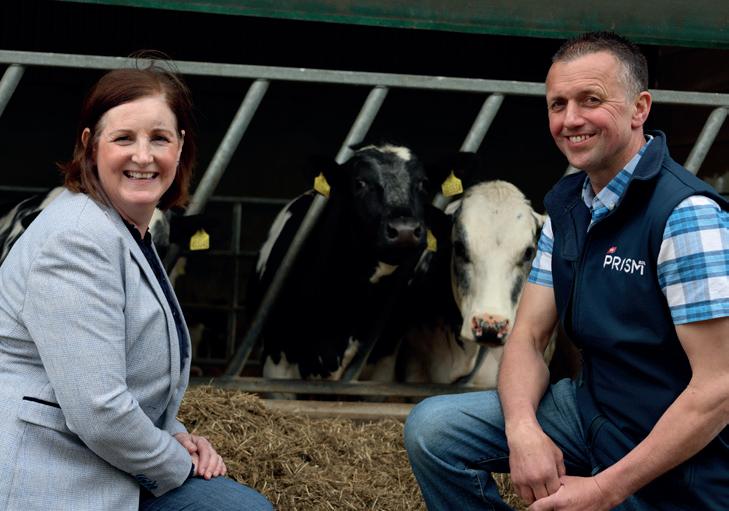
ABP PRISM 2030 is a sustainability initiative aimed at reducing the environmental impact of UK beef and lamb farming. Since 90% of meat and dairy emissions occur at the farm level, ABP is working with 350 selected farmers, including 40 in Scotland, to measure and lower their carbon footprint using SRUC’s Agrecalc tool. Experts from the Andersons Centre provide tailored recommendations, while Harper Adams University analyses anonymised data to refine sustainability strategies.
This program aligns closely with ABP’s business strategy by advancing sustainability in the beef and lamb sectors. ABP has already made significant strides in reducing its environmental footprint, achieving zero waste to landfill, cutting greenhouse gas emissions by 40%, reducing single-use plastics by 60%, and lowering water usage by 47% over the past decade. However, since 90% of the environmental impact of meat and dairy occurs at the farm level, ABP
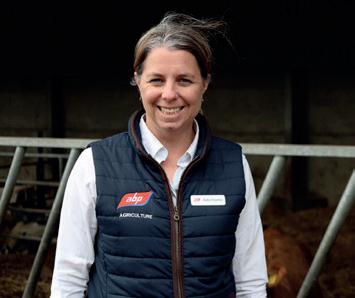
recognises that further progress requires collaboration with farmers.
Ultimately, PRISM 2030 strengthens ABP’s commitment to sustainable food production, enhances its reputation as an environmentally responsible business, and ensures the long-term viability of UK beef and lamb farming. It’s a win-win for both ABP and its suppliers.
Driving through the rolling countryside of North East Fife, I arrived at Billy Cuthbertson’s farm, eager to see firsthand how sustainable beef farming is evolving through ABP Food Group’s PRISM 2030 initiative. It’s one thing to talk about sustainability in agriculture— it’s another to step onto a farm, meet the farmers, and witness the changes being made at ground level.
Billy, alongside his wife and parents, runs a 400-acre livestock unit, with an additional 30 acres rented for grazing. Since moving to the farm in 2017, they’ve steadily expanded their herd, refining their system to improve efficiency, productivity, and sustainability. His cattle are a mix of Limousin, Simmental, Charolais and British Blues, carefully chosen for their growth rates, ease of management and market suitability, rather than sticking rigidly to a single breed. As Billy explained, flexibility is key - adapting the system to suit the livestock rather than forcing the livestock to fit into a predefined model.
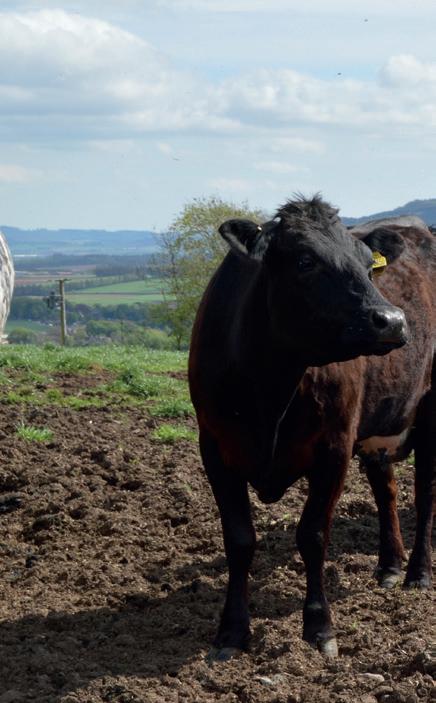
Walking through the fields, it became clear that forage is the backbone of Billy’s operation. The cattle graze through the summer and are fed silage in winter, keeping cereal use to a minimum. The slaughter age typically falls between 20 and 26 months, ensuring the cattle develop at an optimal rate while minimizing environmental impact. Billy’s approach is practical and datadriven. He’s always looking at ways to refine his methods, but sustainability has to be balanced with the realities of running a viable farming business. His involvement in PRISM 2030 came after a conversation with his cattle sourcer—he recognised that carbon foot printing was becoming a major focus across the industry and wanted to get ahead of the curve. While his farm was
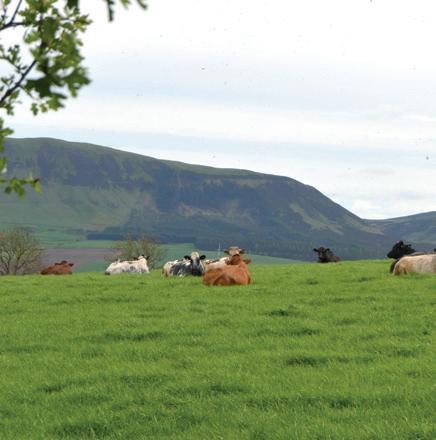
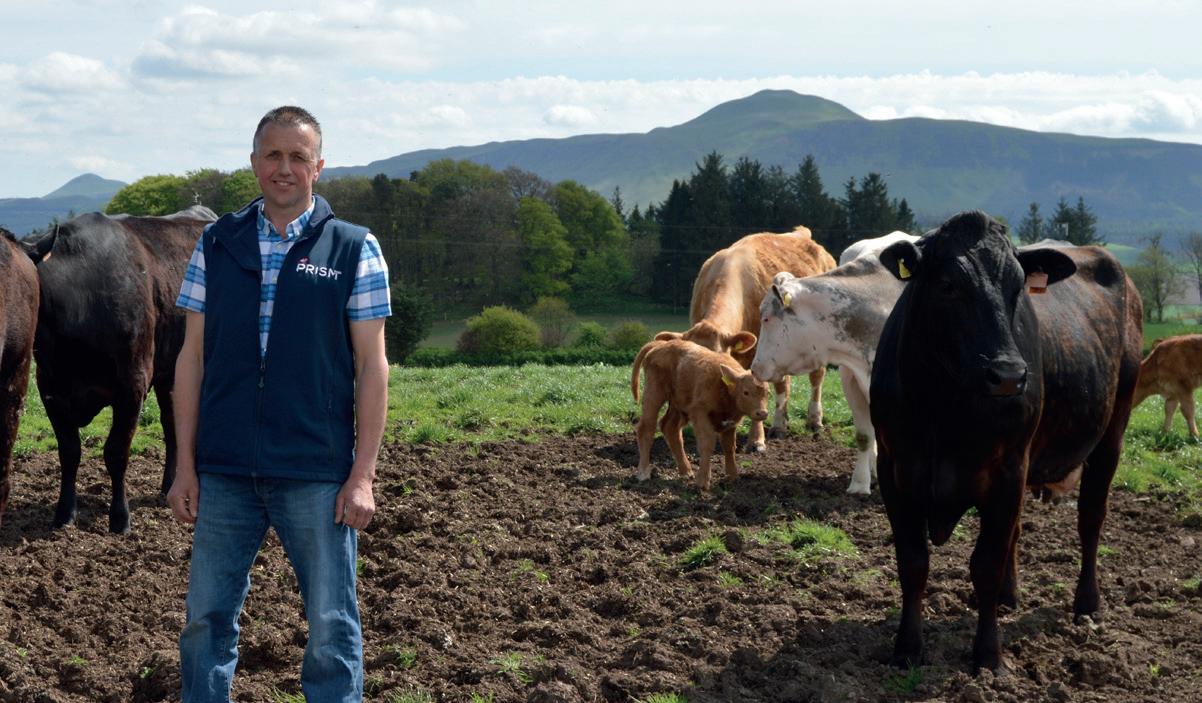
already performing well, he saw value in having concrete data to back up decisions. Numbers don’t lie, and with accurate measurements of his farm’s emissions, Billy could identify areas where he could improve without unnecessary expense or disruption.
As he aptly puts it, “The data we received was really interesting. We hadn’t for example realised how intensive we were farming. Using the information we’ve been given, has enabled us to tweak where we can and may make improvements for example reducing calving levels, what we’re feeding and sewing etc. Being selective and having the flexibility to chose how and what you tweak makes sense and making any changes more viable at all levels.”
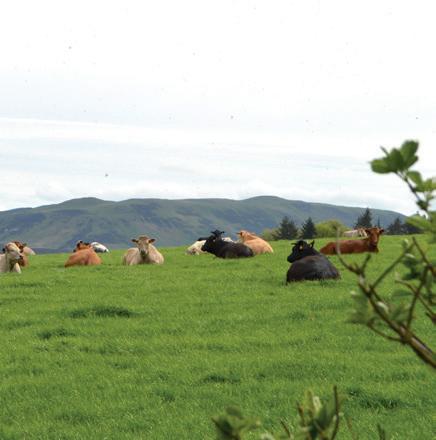

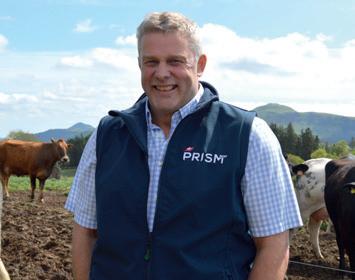
Billy’s experience echoes that of Adrian Ivory, an arable and beef farmer near Meigle in Perthshire, who has been finetuning his operation with sustainability in mind. Adrian’s herd consists of pedigree Simmental and Charolais, alongside a commercial Shorthorn cross Simmental and Herefords. He values the easy fleshing of native breeds, combined with the fast-growing traits of continental sires, striking a balance between efficiency and temperament.
Having supplied prime beef cattle to ABP Perth for over 20 years, Adrian is deeply aware of the challenges of achieving net-zero in farming. His farm’s carbon footprint is already lower than average, but through PRISM 2030, he has actively worked on improving his herd’s in-calf rate, pushing it from 90% to 95% —a seemingly small change that has significant implications for sustainability and profitability.
Speaking about what drives him to constantly improve efficiency on his farm Adrian said, “I love days. In many ways I want to be the Sir Dave Brailsford of farming. I want to scrutinise how the livestock is performing and find even the smallest of adjustments to see improvements made which in turn bring additional benefits including better productivity and profit. Every improvement is a positive.
“I was also interested in some of the online talks I could tune into being part of the PRISM programme. I always like to come away from those with questions like ‘have I done that?’, ‘why haven’t I done that?’, ‘should I try it?’. It’s a great way to keep challenging practise.”
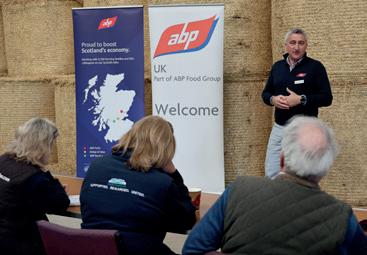
Both Billy and Adrian have been supported by Harper Adams University and Andersons consultants, who provide expert recommendations based on carbon footprint assessments. Some of the suggested strategies include:
Rotational grazing to maximise forage use, leading to an extra one tonne of dry matter per hectare.
Reseeding pastures with high-protein, multi-species leys to enhance soil health and livestock nutrition.
Considering direct drilling or reduced tillage cultivations to improve soil structure and reduce emissions.
These are practical, evidence-based solutions that don’t just sound good on paper—they work in real farm conditions. Both farmers have implemented various aspects of these recommendations and are now seeing the real-world benefits in terms of lower emissions, better efficiency, and improved profitability.

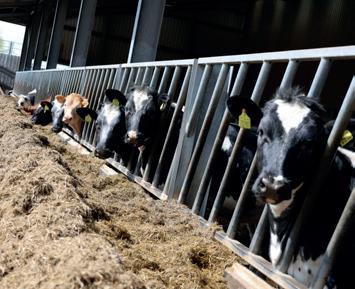
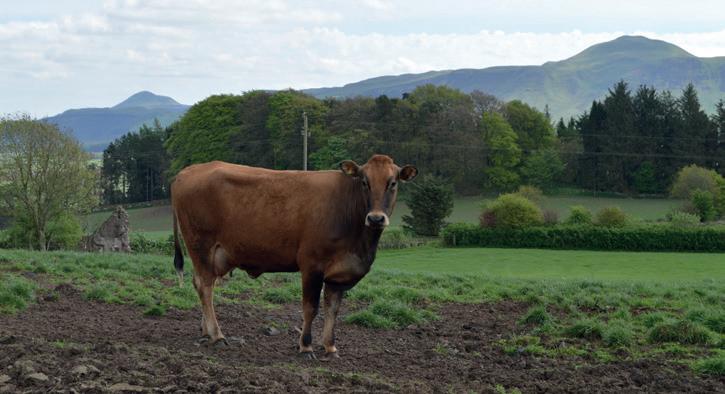
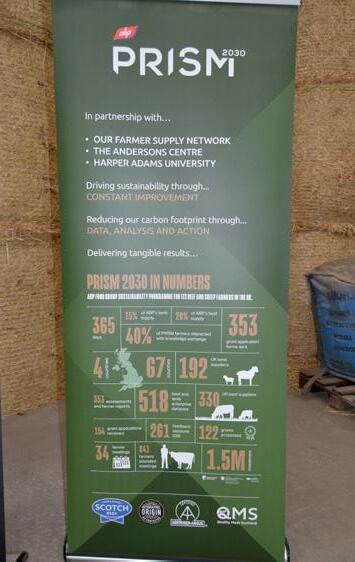
The next round of carbon footprint assessments is nearing completion, giving farmers a clearer picture of how these targeted adjustments have helped reduce emissions. What’s evident from Billy and Adrian’s experiences is that sustainability doesn’t have to come at the cost of profitability. With programs like PRISM 2030, the UK beef industry is proving that efficiency, environmental responsibility, and economic viability can go hand in hand.
Visiting farms like Billy’s and Adrian’s reinforces the idea that sustainability is not just a buzzword - it’s becoming a reality. The future of British beef production is being shaped by sciencebacked decision-making, a willingness to adapt, and a growing recognition that sustainable agriculture is not just possible - it’s essential.
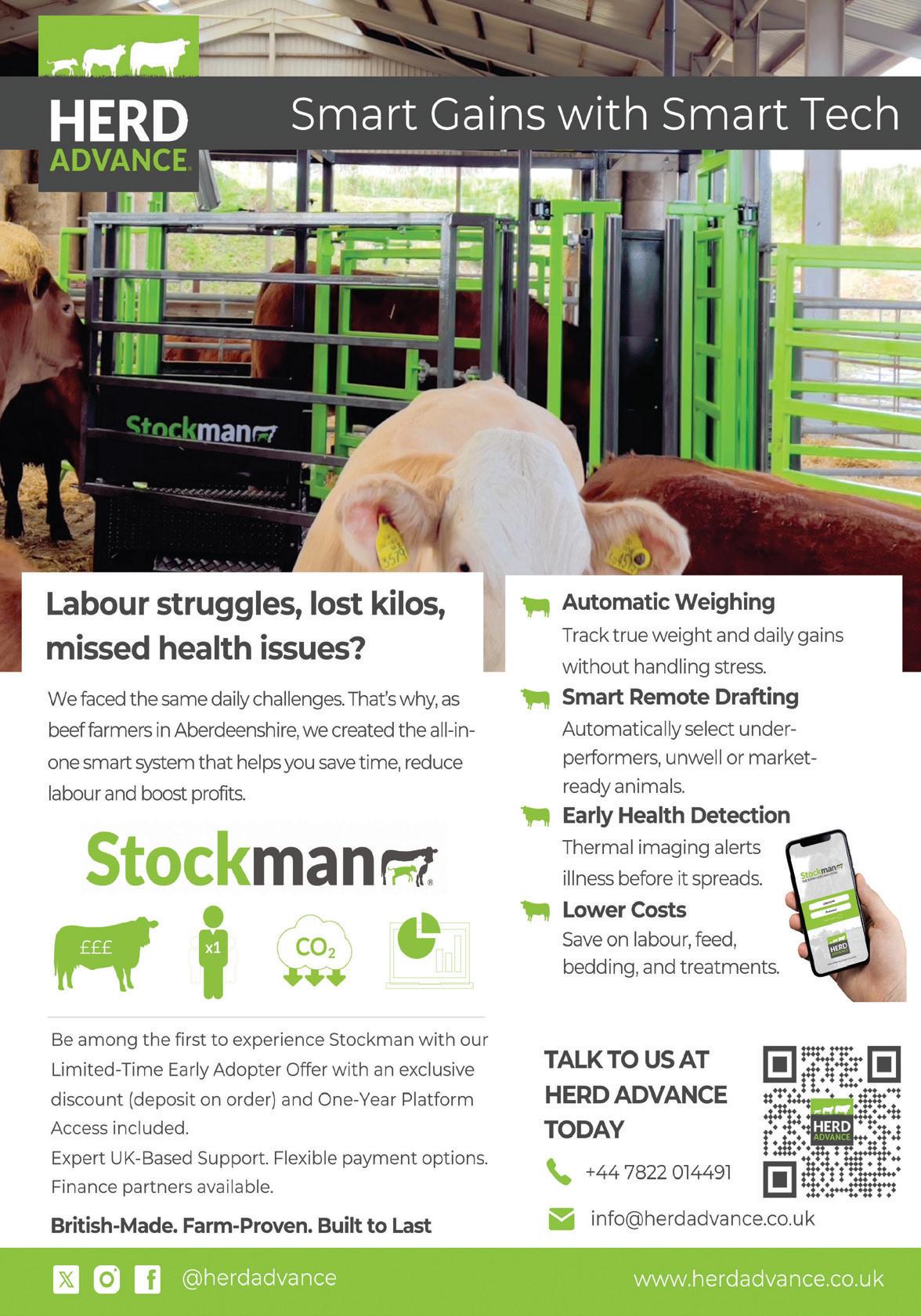

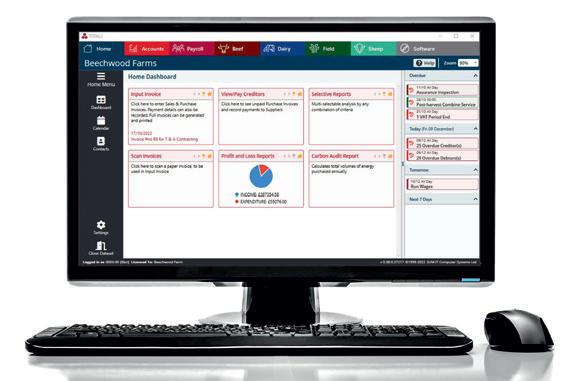
TOTAL2 Farm Accounts software makes easy work of doing your VAT whilst building a powerful range of farm-business specific management reports that analyse the performance of each of your enterprises – think diversification performance reports at the touch of a button.
Budget Cashflows can be generated for whoever requires them and regular comparison with actual figures keeps you on track. Bank reconciliation can be manual or automatic, depending on your preference. Then at the end of the year you can send your data direct to your accountant who receives an auditor version of TOTAL2 from SUM-IT free of charge.
All of this backed up by the friendliest Support team in Thame, Oxfordshire, available twelve hours a day plus six hours on Saturdays.
With initial purchase prices (excl. VAT) starting from £ 495.00 including 3 months Gold Level Support, and then on-going Support from £ 79.00 per annum, it doesn’t take long to show great savings when compared to generic accounting software on monthly subscriptions, and it’s designed specifically for farmers!
Our hybrid software provides complete flexibility for all situations:
Not an issue, just run the TOTAL2 data locally on your PC
Run in the Cloud and multiple authorised operators can then have access to real-time TOTAL2 data, with permissions set by YOU
Just choose which level suits your requirements –Starter (Cashbook) or Standard (Full Accounts) And decide whether to run it LOCALLY on your PC or in the CLOUD for access from multiple machines
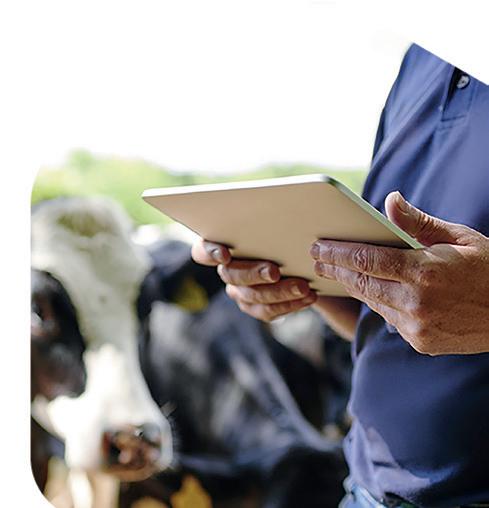






Beatrice Morrice Head of External Affairs





Al Walker Political Affairs Advisor
NFU Scotland President Andrew Connon and Deputy CEO/Director of Policy Jonnie Hall visited Westminster last month to meet with a number of MPs and Lords. There they discussed a variety of current issues facing farmers and crofters in Scotland. They conveyed to politicians that current Inheritance Tax proposals would seriously impact the viability of family farms. The Union is still calling for the UK Government to pause these measures and consult with the industry before there is irreversible damage to agricultural businesses.
The team also discussed trade issues, such as potential barriers to the Internal Market Act and trade deals with other countries. They underlined the need for the UK Government to safeguard farming and its core standards of food safety, animal welfare, and environmental protection in any future trade negotiations.
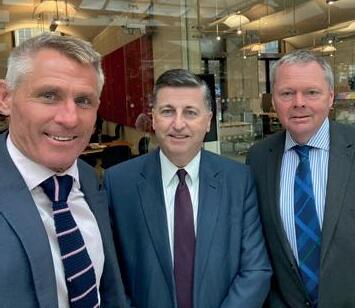
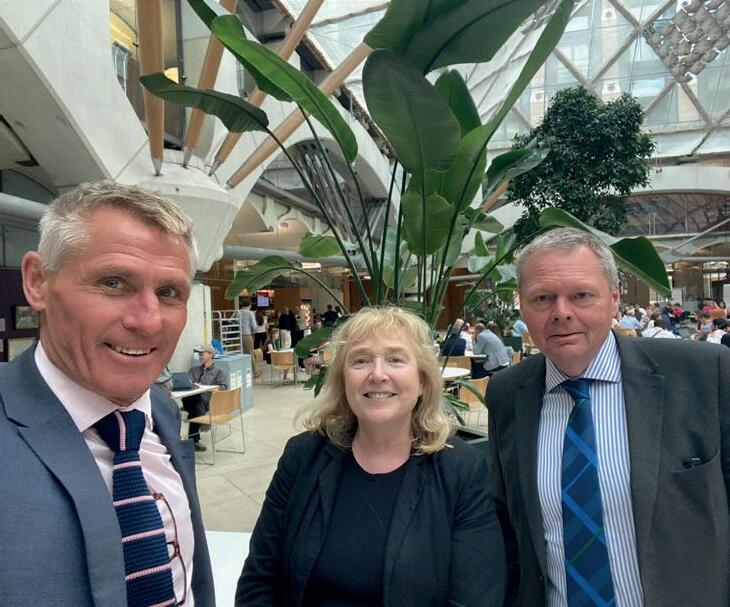
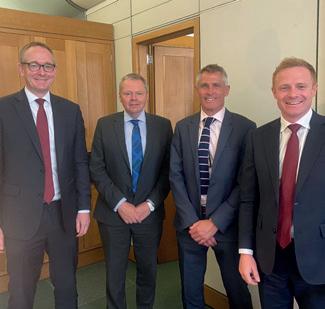
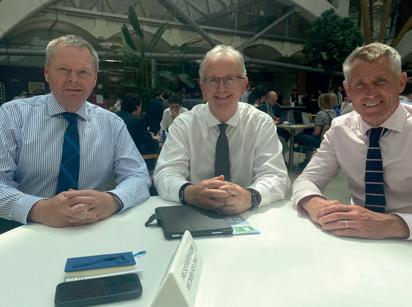
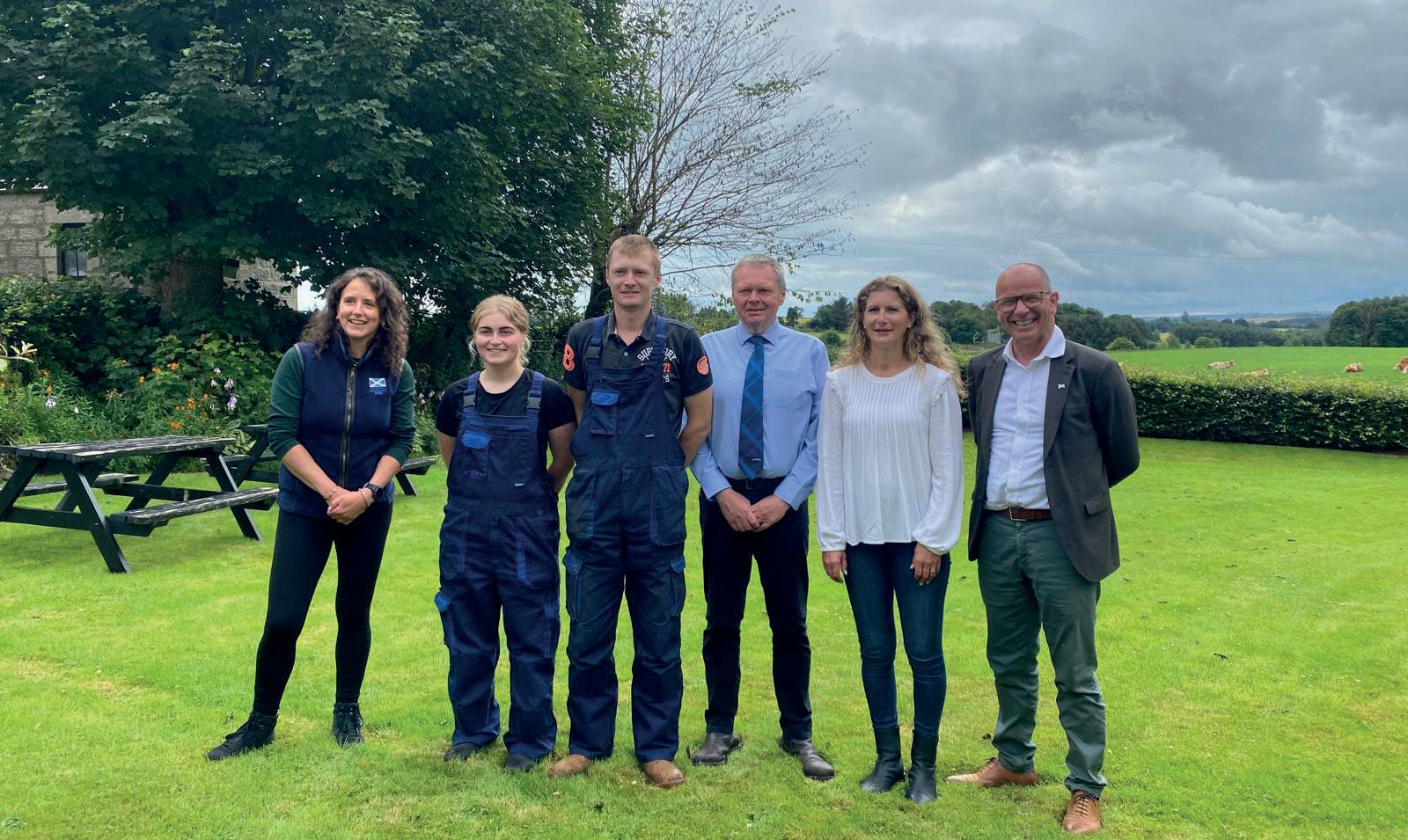
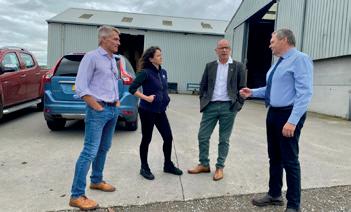
During Summer recess, the Cabinet Secretary for Rural Affairs, Land Reform and Islands, Mairi Gougeon MSP, and Minister for Agriculture and Connectivity, Jim Fairlie MSP, visited Andrew Connon’s Farm. This visit provided the opportunity for the Cabinet Secretary and Minister to see the workings of our President’s farm. President Andrew Connon and Deputy CEO/Director of Policy Jonnie Hall discussed future agricultural policy and how we can continue to work with the Scottish Government to support a profitable and sustainable sector.
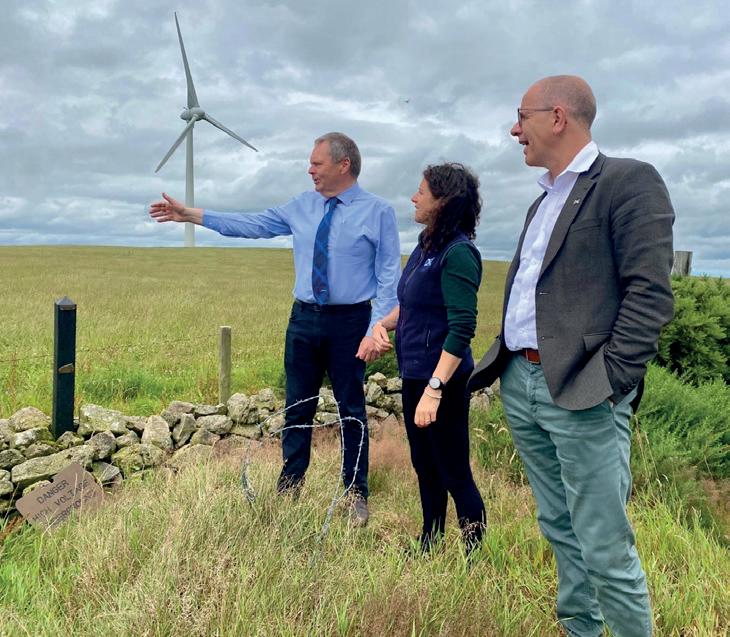
NFU Scotland welcomed the opportunity to meet Baroness Minette Batters while in London. The team provided the Union’s submission to the UK Government’s Farm Profitability Review, which she is leading. This review aims to help identify issues
facing the industry and provide recommendations to deliver a sustainable and profitable agricultural sector. Profitability had been an ongoing challenge for many agricultural businesses across Scotland. While agriculture is devolved and policy continues to diverge, several issues remain relevant to both
Scotland and the rest of the UK. Given the significant role that farming and crofting plays in rural communities across Scotland, and how vital the next generation is for agriculture across the whole country, ensuring that this review’s recommendations and findings are considered will be important.



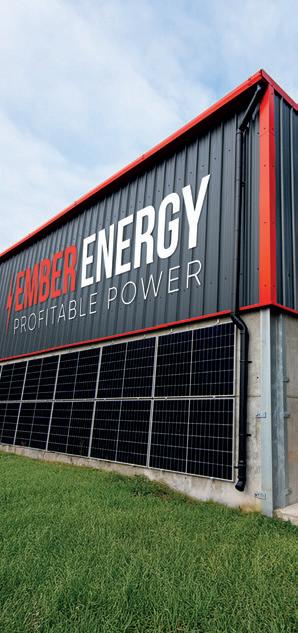


Cemsix Corrugated Sheets.
Swisspearl Cemsix is a high quality, corrugated fibre cement roof panel used as roofing and cladding on agricultural and industrial buildings. It is non-combustible, weather resistant, low weight and durable.
• BBA Accredited
• Maintenance free
• 30 year product warranty
• 10 year colour warranty
• Range of Accessories


















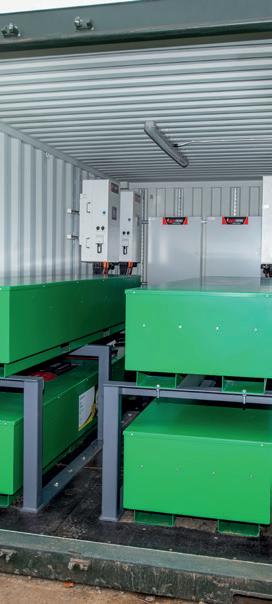



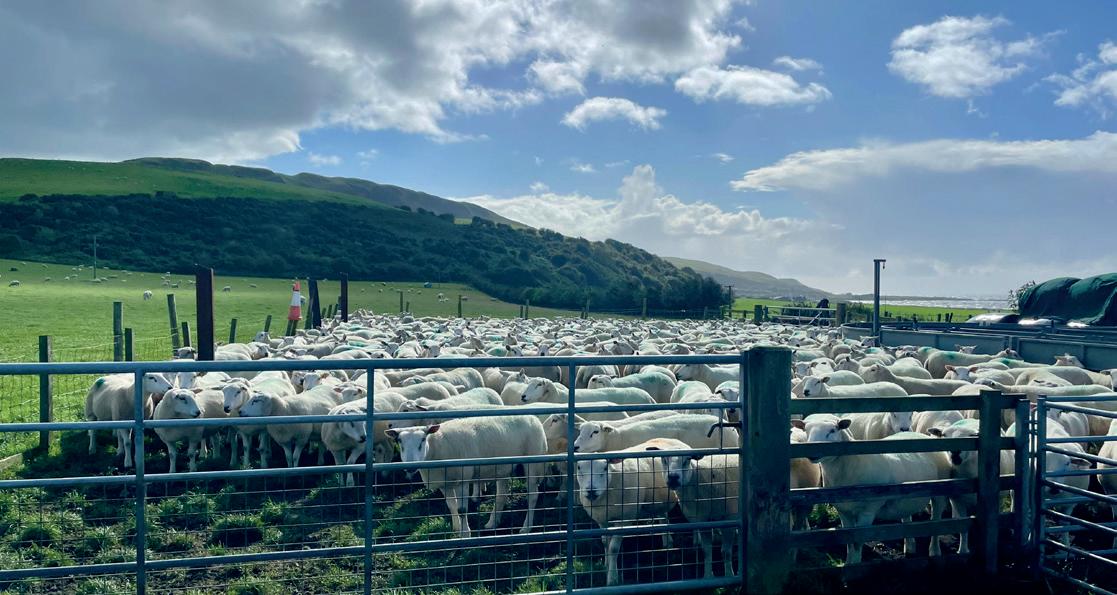
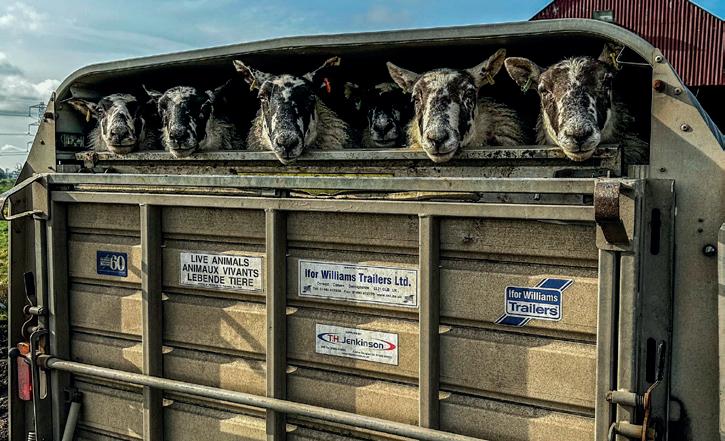




SLucy McGillivray Policy Manager
cottish Government has announced plans to relax Bluetongue Virus 3 (BTV3) testing requirements for crossborder livestock movements from late September. This move, welcomed by NFU Scotland, will bring relief to keepers and especially those of sheep, who were looking to move animals without the cost prohibitive of testing requirements.
This change refl ected Government’s risk-based approach to BTV3. It
wanted to do all it can to protect Scotland’s animals, whilst recognising business pressures on producers and trying to balance benefi ts against the cost of measures. Scottish Government has worked closely with disease experts and meteorologists to predict when the risk of transmission between Scottish animals was expected to fall as cooler temperatures tend to reduce this drastically.
Normally, low risk periods have been announced after weather and midge activity data was recorded and assessed, allowing a low-risk period to be declared. Scottish Government has taken this new forecasting approach having recognised the importance for the sector to plan and know when they will be able to move animals with
reduced restrictions.
While this approach has not guaranteed that the disease will be unable to be transmitted in late September, it provided a window for when the predicted risk will be lower. Vaccination has remained the best way to protect your livestock against BTV3 and the Union has continued to advise keepers to consider this while speaking to their vet for more information.
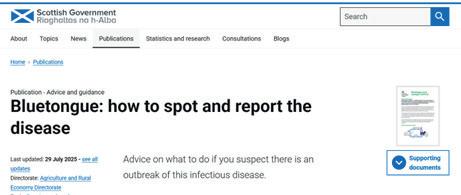

For information on the changes and what this means for you, please refer to our Business Guide Update on the NFUS website: http://bit.ly/416Ges1 or visit the Government’s Bluetongue page at: www.gov.scot/publications/bluetongue/
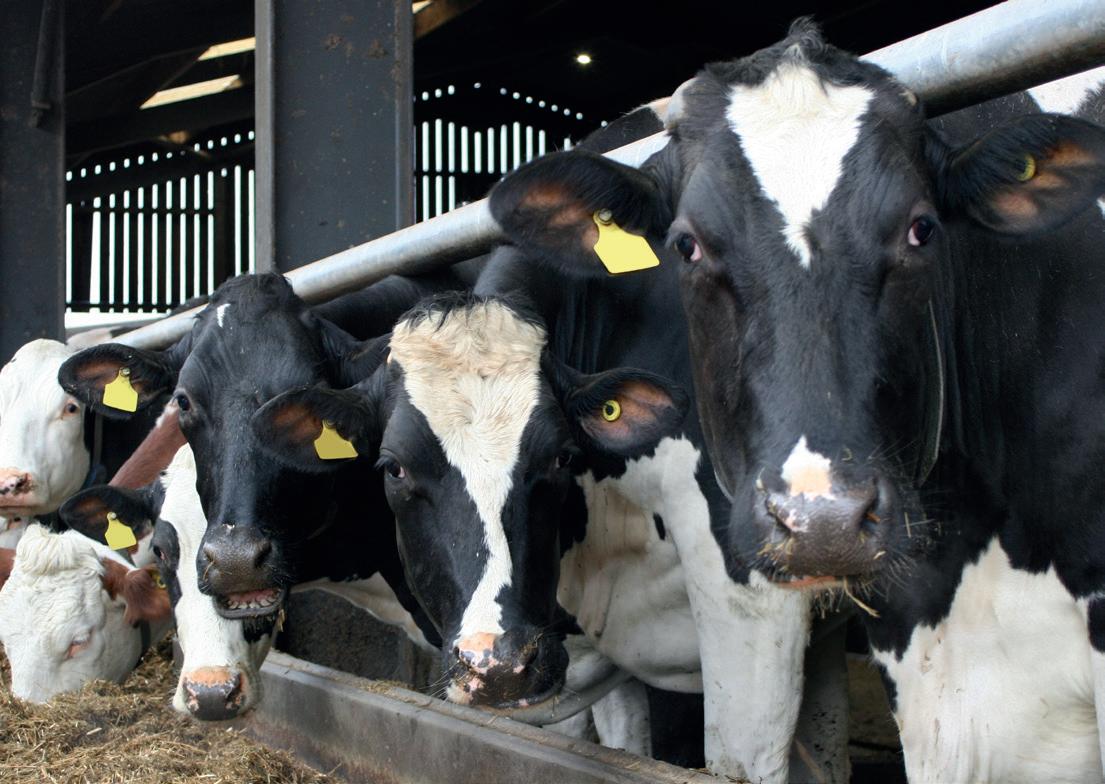


Bob Carruth Policy Manager
NFU Scotland has begun investigating concerns raised by members regarding milk quality testing and current procedures.
Currently, milk from bulk tanks is sampled at collection by tanker drivers and samples are sent, usually overnight, for quality testing. Results are shared via text or email with individual farmers. These results carry economic weight, aff ecting both premiums and penalties, making the accuracy and reliability of testing and transport critical.



Following a June Milk Committee meeting where members expressed issues with the system, NFU Scotland held an online meeting with National Milk Records (NMR) Ltd. NMR oversees milk quality testing and has been responsible for transporting samples from processors to testing sites as well as delivering results promptly to farmers.






Previously, testing occurred at Hillington near Glasgow but has



been changed to Four Ashes near Wolverhampton taken from 11 Scottish sites via three routes. NMR logs location and temperature data every ten minutes from the point of collection. However, not all Scottish sites use temperature loggers, raising concerns about the consistency and reliability of the quality control chain, particularly in areas beyond NMR’s remit, such as initial collection and storage, which fall under the Dairy Transport Accreditation Scheme administered by Dairy UK.




In response, NFU Scotland has submitted detailed questions to Dairy UK regarding the accreditation scheme, seeking clarity on:
Information access:
What data is available to individual producers?
Accountability:
Are samples traceable to specifi c vehicles and drivers?
Standards:
Are there requirements for tankers to maintain sample integrity?
Monitoring:





















Given the fi nancial implications of milk quality, producers need to act swiftly in response to poor results. Yet they often lack broader context, unable to determine if similar issues have aff ected others or whether a problem stems from tanker transport, routing, or depot storage.






Are temperature loggers mandatory in sample boxes?
Oversight:


Are tankers, drivers, and storage facilities audited or subject to spot checks?


Traceability:
Is there an independent audit process from farm to NMR collection?





The Union has aimed to ensure that all links in the milk quality chain are transparent, reliable and accountable to support producers facing fi nancial risk from testing discrepancies.


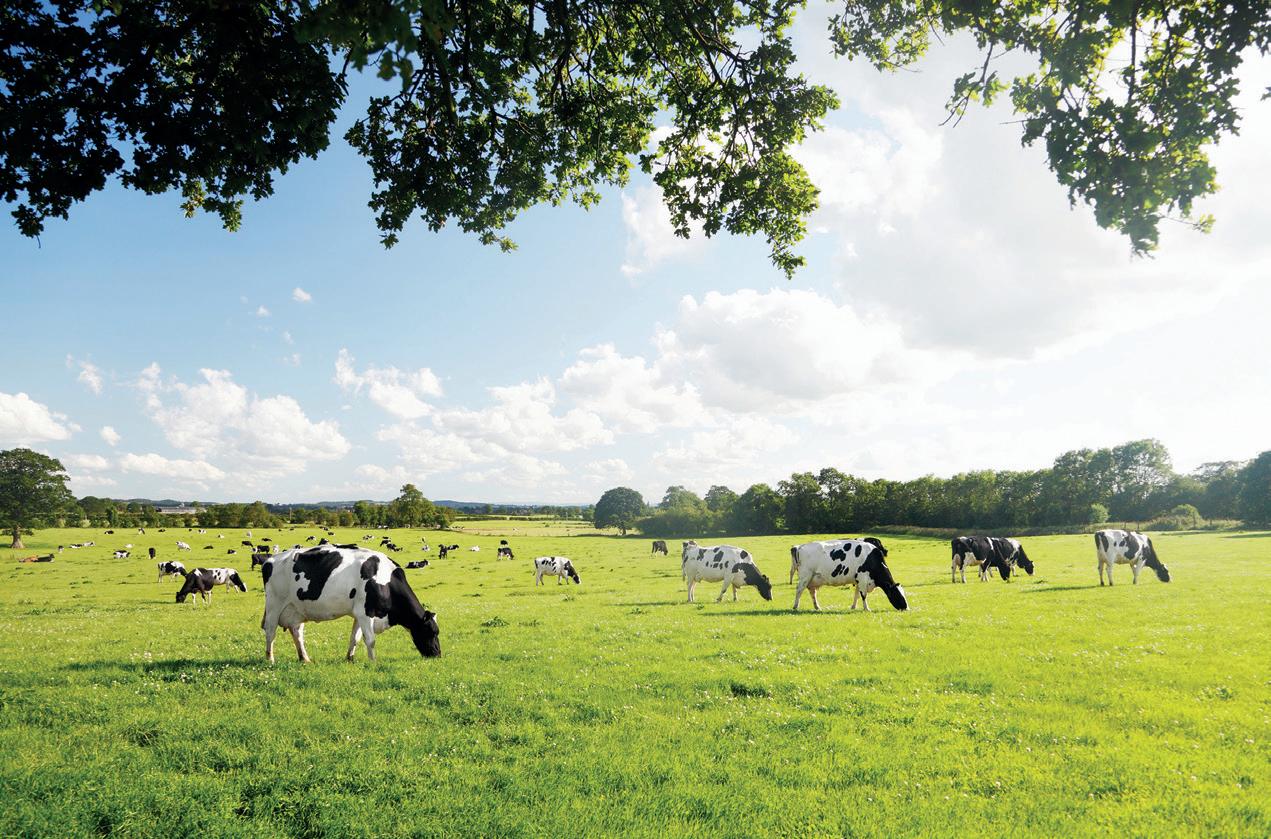

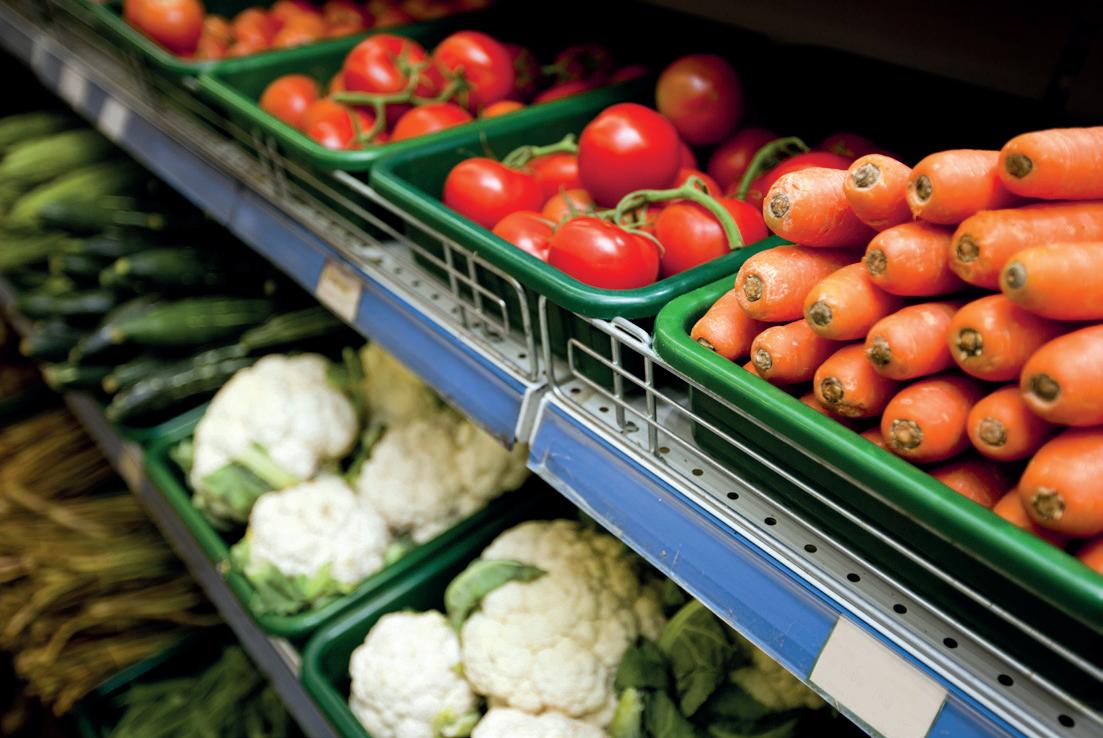




ELisa Hislop Policy Manager
arlier in the month, we met the new Supply Chain Forum responsible for the delivery of our supply chain strategy and associated workstreams. This forum was designed complimentary to the existing commodity committee structure that continues to have direct oversight of sector specifi c issues.
It was made up with a representative from each commodity committee but with scope to invite experts where necessary. Alongside overseeing the supply chain strategy, the group has also been tasked with establishing policy positions related to relevant emerging government policy. These include labelling reform, Good Food Nation, Farm Assurance, supply chain infrastructure and the supply chain adjudicators (Groceries Code
Adjudicator and Agricultural Supply Chain Adjudicator).
While the group planned to meet on a relatively ad hoc basis, it will also work in tandem with committee meetings to ensure consistency across workstreams.
If you’re interested in more about the forum, please visit www.nfus.org.uk.
NFU Scotland’s Horticulture Working Group has discussed our response to the Scottish Government’s Fruit and Veg Aid Scheme consultation. The scheme supports groups of fruit and vegetable growers, recognised as Producer Organisations (POs), encouraging
them to work collaboratively to increase quality and quantity of grown produce. It has been a vital tool in enabling innovation, research and development in the sector which has supported the growth of our horticulture sector.
The consultation has been structured around key proposals to shift funding
towards Scottish production, refl ecting the fact that the scheme will now be delivered by the Scottish Government. Our response stressed the importance committed continued funding and ringfenced budget while reiterating that POs need at least three to six months’ notice for any changes.
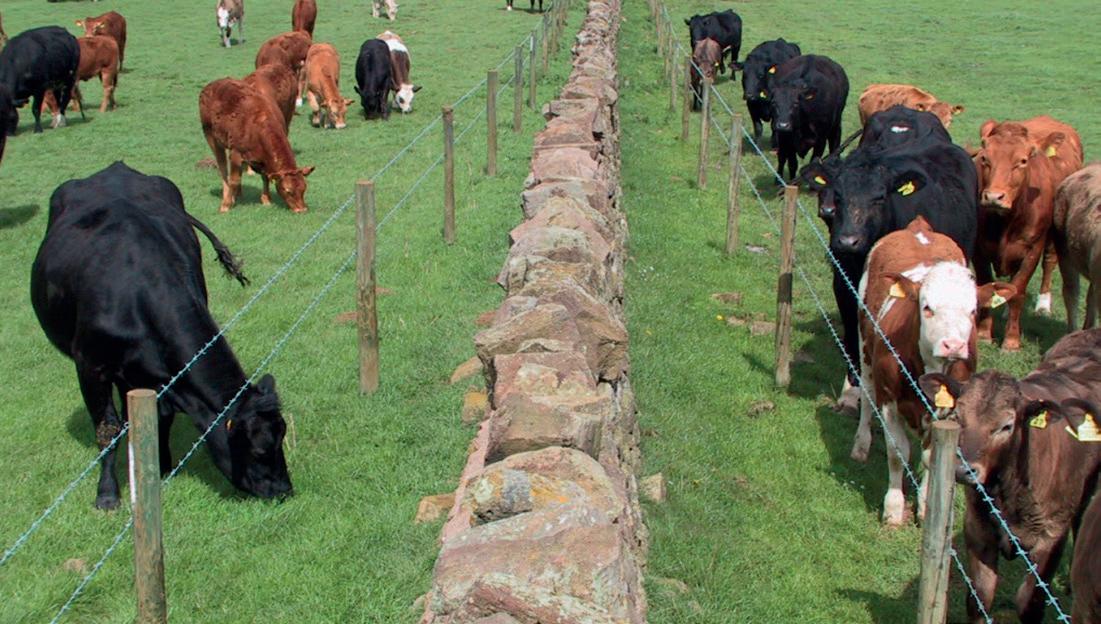




Penny Middleton Policy Manager
Cattle farmers and crofters have been asked to help co-design a simulation model aimed at eradicating Bovine Viral Diarrhea (BVD). The model, developed jointly by SRUC and University of Nottingham, aimed to be the fi rst to include farmer decisionmaking and preferences as a separate component in modelling national cattle disease control.
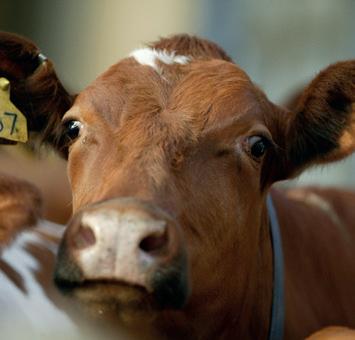
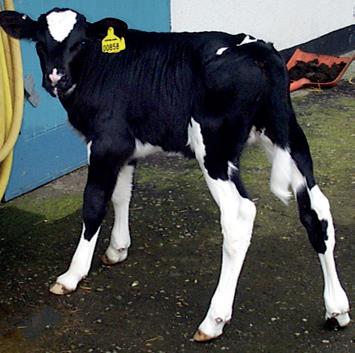
A questionnaire was designed to collate input where participating cattle keepers are given a range of scenarios and asked what they would do next. Answers will then be linked to models of pathogen spread to predict how quickly the disease might decline or increase based on diff erent control circumstances.
Sitting on the model’s advisory panel, SRUC’s Veterinary Centre Manager Helen Carty said the rest of the UK could learn from the Scottish BVD experience. Understanding and including farmer decision making into the modelling work could also speed up the disease’s fi nal eradication in Scotland.
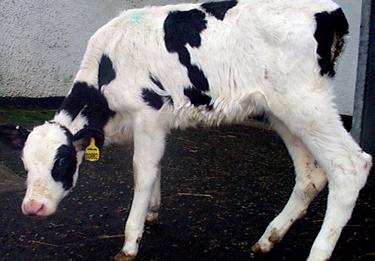
NFU Scotland members have been urged to engage with the survey which closes at the end of September. Visit http://bit.ly/cattlediseasedecisions or scan the QR code below to complete the questionnaire.

For a summary of the project and BVD control programmes across UK and Ireland, visit www.bvdplatform. org. Once the model has been built, experts have intended to adapt it for use mitigating other diseases.




















































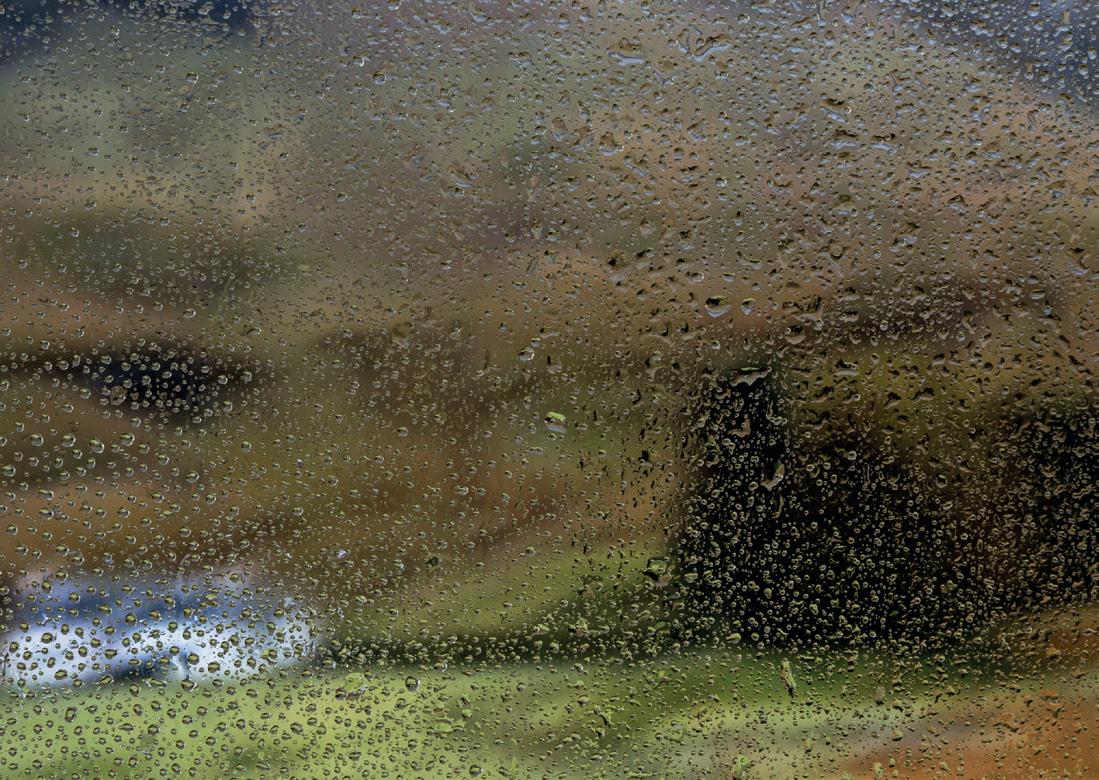





















































































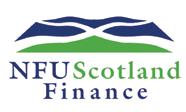
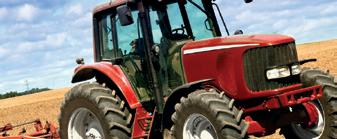

PROFITS
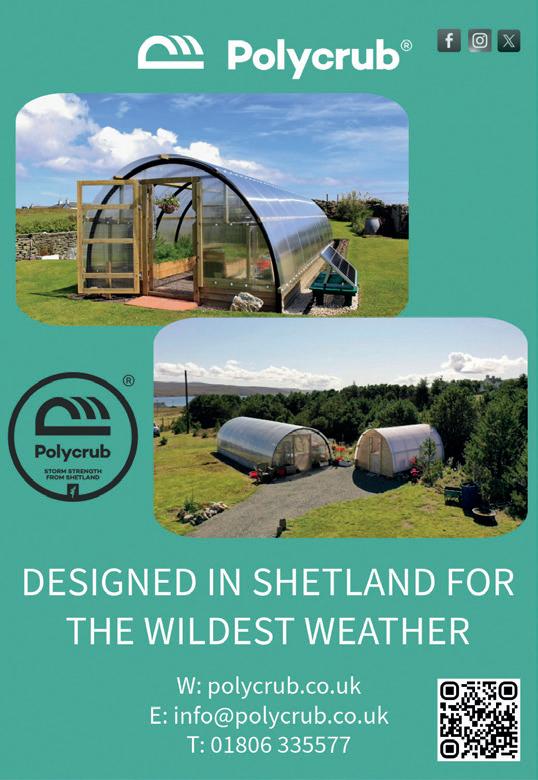
My experiences with NFU Scotland Finance administered by Anglo Scottish Finance has been excellent
Always the cheapest or 2 cheapest of all quotes received with the added benefit of NFUS receiving a contribution for their coffers too. nd
ff t
ou d r c mmend
ething,
Would highly recommend getting in touch the team the next time you need finance for something, they really can save you money
Rona Nicolson Messrs ACM Nicolson & Claylands Farmers
essrs AC Clay ands co e s oo.


















ASarah Cowie Senior Policy Manager
griculture has been grappling severe periods of water scarcity as prolonged dry spells and shifting weather patterns disrupted traditional farming cycles. Historically, we have been reliant on wet winters to replenish groundwater but now, many regions, particularly in the east and in the Highlands, have faced depleted water reserves and unpredictable rainfall. This has led to significant challenges for livestock and crop producers. Farmers and crofters reported poor grass growth, early silage feeding and the need to transport water to livestock as adding financial and labour burdens.
In response, we actively supported members through guidance and advocacy. We issued practical advice on efficient water use including night-time irrigation, leak checks and switching to groundwater sources where feasible. We have encouraged collaboration with neighbouring farms to stagger water use and reduce pressure on local sources. Farmers growing high-value crops like potatoes and soft fruits were urged to irrigate only when absolutely necessary. We have advocated for long-term water management strategies, hoping to see agriculture as an essential use of water recognised in national policy. We have underlined the importance of longterm resilience planning and encourage greater investment for on-farm water infrastructure. The most recent round of the Future Farming Investment Scheme, which prioritised water efficiency
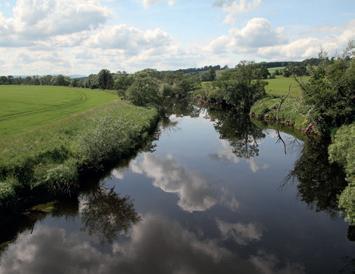
measures, was welcomed by NFUS. We have continued to work closely with Scottish Environment Protection Agency (SEPA) and other stakeholders, ensuring that abstraction licenses are used responsibly and long-term resilience strategies are developed. As climate variability has intensified, we have been advocating for infrastructure investment and policy support to help Scotland’s rural communities adapt.
Keep informed about water scarcity issues via SEPA and the Farm Advisory Service websites: https://waterlevels.sepa.org.uk/ bit.ly/4m0uVtM




HDavid Michie Senior Policy Manager
arvest has always marked a key moment in the agricultural calendar, when the effort and investment put into growing crops finally pays off. But at current prices, harvest has sadly become more about reducing losses than making a profi t and frustration has grown around imported grain being used in Scottish products.
Distillers have produced more spirits than the market needs in recent years and with alcohol consumption falling, Scottish production has slowed. At the same time, global grain supply is high while demand is low. While domestic harvested grain sits unsold in sheds, the continued flow of imported grain into the market appears to be applying even more downward price pressure.
Still, large-scale processing, whether for feed or whisky, needs large quantities of ingredients. In

recent years, the UK has shifted from having a wheat surplus to now running a deficit. This isn’t a one-off ; it’s a clear trend. To meet demand and specific quality standards, processors have begun importing wheat. As part of a free-market economy, they’re legally allowed to buy from countries we have trade deals with, even if we don’t like seeing those imports used in Scottish products.
Transparency across the supply chain has always been vital, especially for iconic Scottish goods. That’s why we’ve been investigating the issue on behalf of our members. We have held a supply chain roundtable, spoken to key industry players and visited both a grain trader and a maltster. At this we discussed traceability, assurance of imported and homegrown grain, the role of farm
assurance schemes, the importance of provenance and how assurance standards from abroad compare. The AHDB has begun reviewing farm assurance, including imported grain. We planned to engage with this to make sure member views were heard. We have also begun formulating a response to a government consultation on supply chain fairness.
Amid tough price forecasts, there have been glimmers of hope. Some grower groups have secured premiums for provenance and sustainability practices. Others have used pooled pricing and expert advice to reduce risk and make better contract decisions. These approaches help give farmers a stronger negotiating position; something we all need when prices are this low.
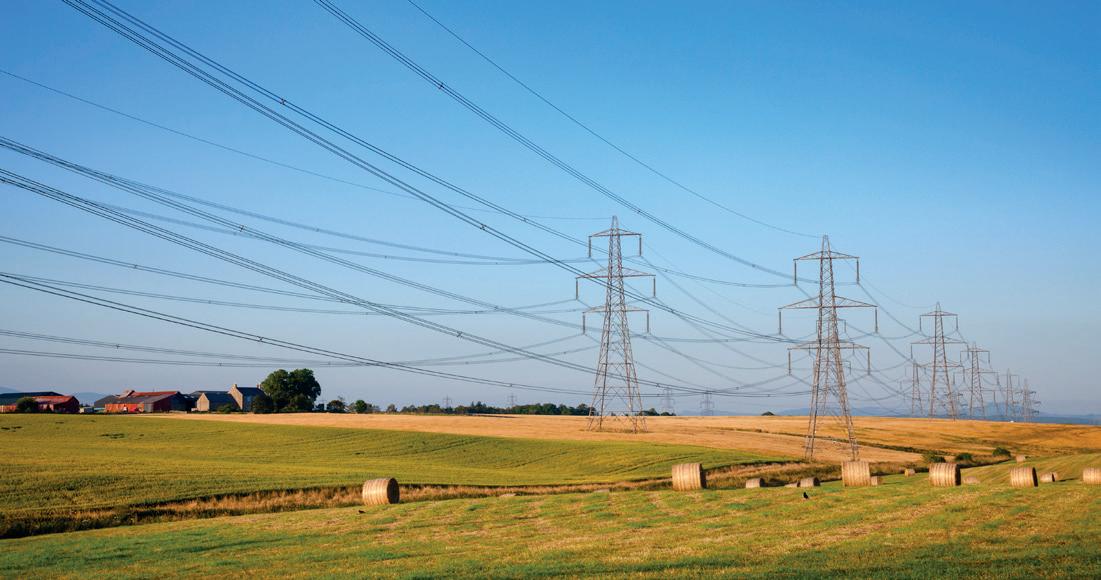




ARhianna Montgomery Policy Manager
s notices arrived for the Kintore to Tealing 400kV overhead line, we made sure members were fully informed and supported. These voluntary agreement notices are legal arrangements between the landowner and utility company, allowing access to land for the purpose of installing and maintaining electricity infrastructure. Historically, these agreements have been presented in one of two ways:
1. Wayleave Agreements:
• Voluntary and negotiable.
• Provides an annual payment while the infrastructure remains in place.
• These are personal agreements, meaning they usually end if the land is sold or passed on.
• Wayleaves off er less legal permanence and often come with lower compensation than servitudes.
2. Deeds of Servitude:
• These create a permanent legal right attached to the land, not just a contract between two parties.
• The agreement stays in place even if the property is sold.
• Because of their permanence, they may come with higher compensation but they place a lasting burden on the land.
Members that received a voluntary agreement notice have taken it seriously. By ignoring it, your ability to negotiate eff ectively with the utilities company could have been impacted and therefore, not advised.
Instead, after determining which form of notice you received, review it carefully by looking at the length of the agreement, the specifi c areas of aff ected land and any terms around renewal or termination. The positioning
of the infrastructure as well as the tower, ground to line clearance heights (SAG), should also be considered. NFUS recommended that members seek expert advice as these documents are legally binding and could impact future use of your land or any plans you may have to develop, sell or lease it.
Futhermore, signing a voluntary agreement can allow the electricity company ongoing or even permanent access to install, operate and maintain infrastructure on your land, limiting what you do with your property in the future. As such, the Union insisted that all who received a notice letter, fully understanded the legal and financial consequences prior to signing.
The Kintore to Tealing line has become a major national development. As such, the Union has continually insisted that landowner rights must be protected in the process. Members looking for additional guidance should contact our Utilities Helpline, in partnership with Davidson & Robertson, on 0131 609 9717.

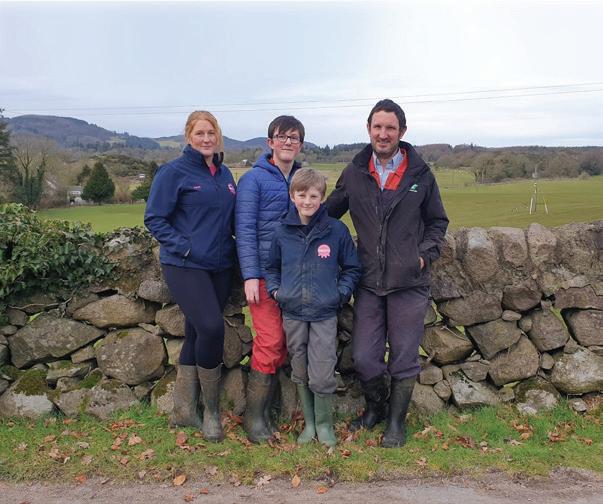








At Mutch Fire & Security, we are committed to safeguarding your property with industry-leading fire and security solutions.
Based in Aberdeenshire, and founded by Greg Mutch - an installation engineer with 25 years of experience - we pride ourselves on delivering reliable and tailored security services to both residential and commercial clients across Aberdeenshire and Aberdeen City.
With over two decades of hands-on experience, our team offers expert advice, professional installation, and ongoing support for all your fire and security needs.






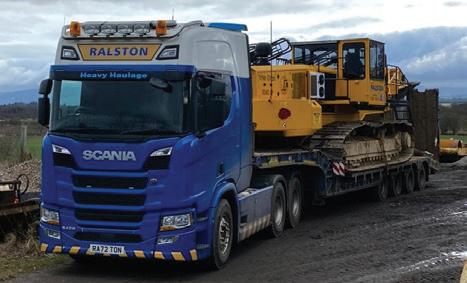
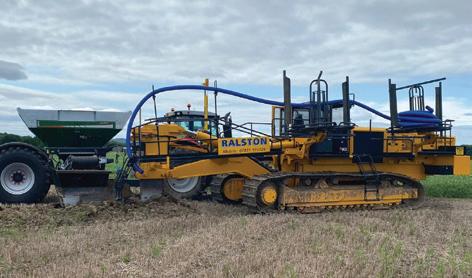
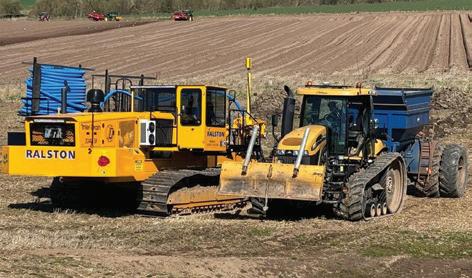
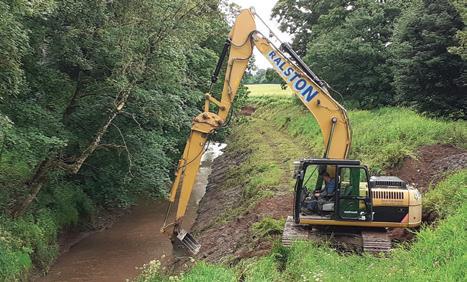


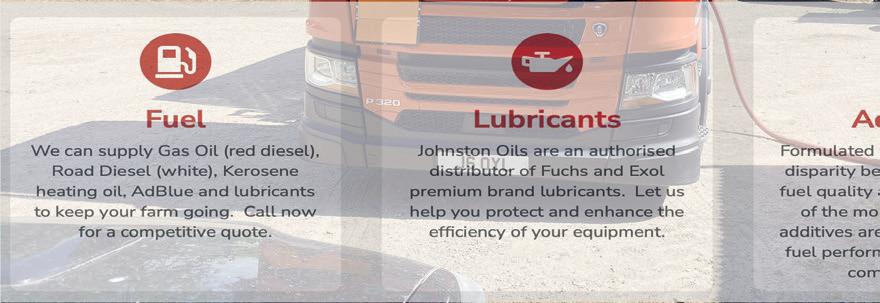
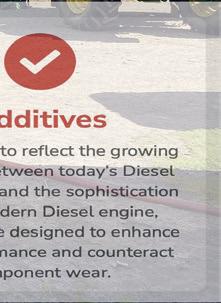
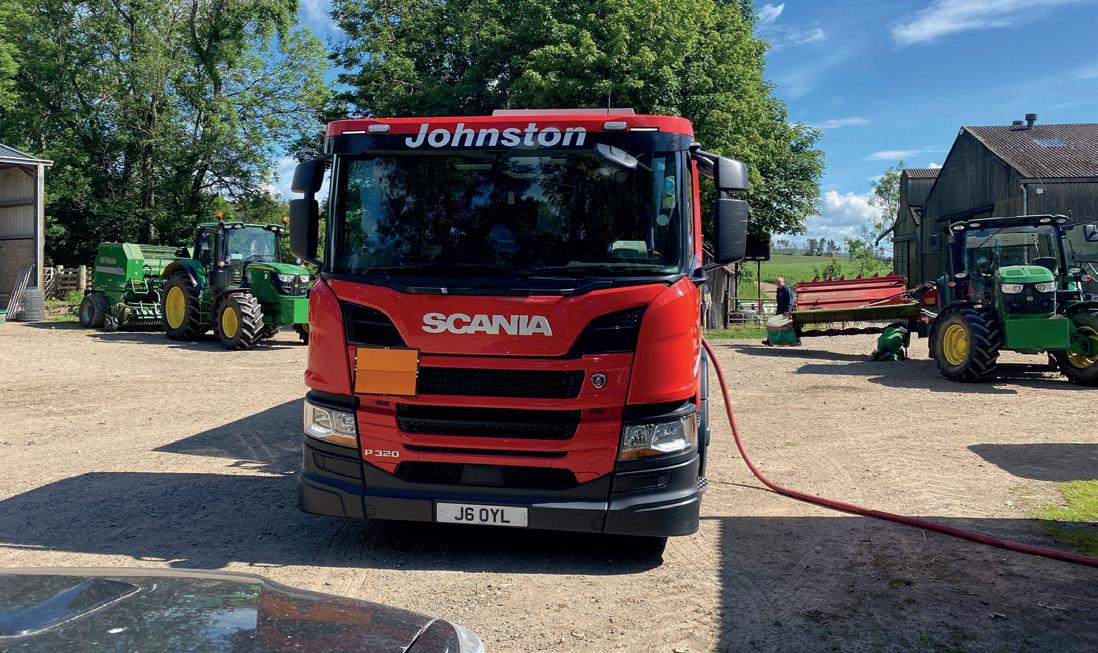

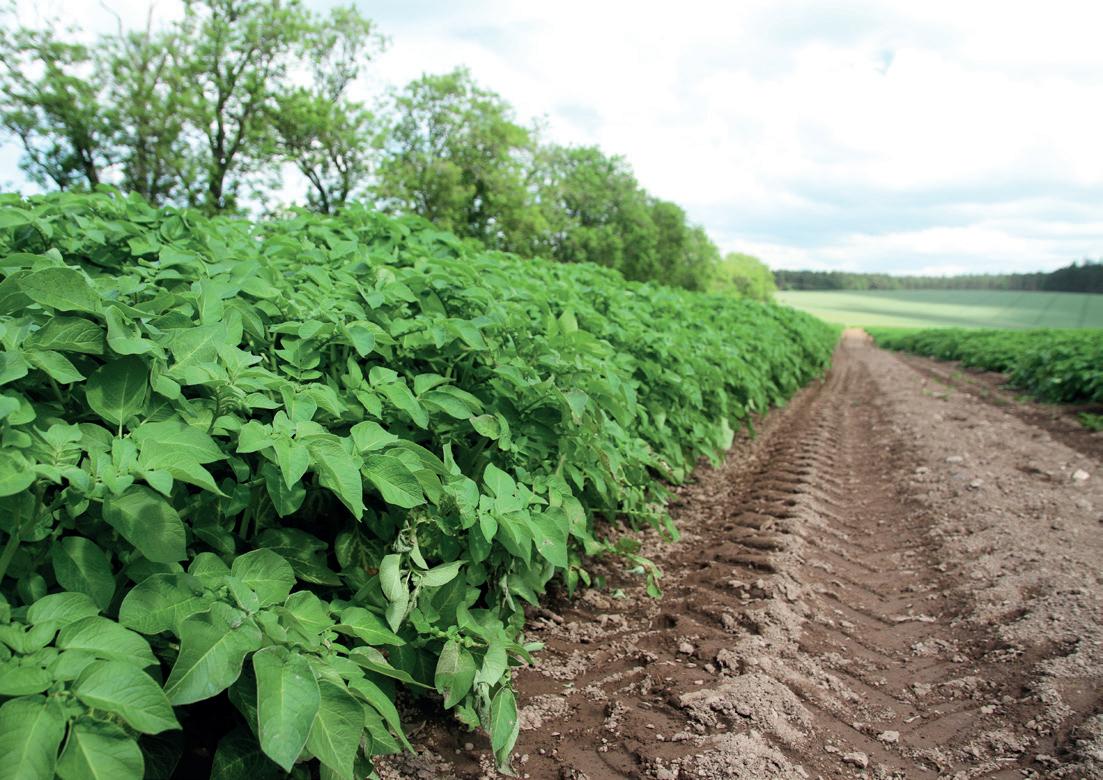




RJonnie Hall Deputy CEO/ Director of Policy
egardless of interim changes to existing direct support schemes, NFU Scotland must develop a preferred delivery model for future direct support from 2028. We must be clear, and in agreement on Tiers 1 and 2 direct support structure as well as the levels and proportions of funding we think are necessary to enable agriculture to deliver on policy.
So far, the transition of direct support has been slow, marked out by minor tweaks to existing Common Agricultural Policy (CAP) schemes. While this has allowed for signifi cant stability through an era when many farms and crofts have needed it, we must move forward.
We must enable farmers and crofters to adapt by a system of direct support that targets agricultural activity and actions, rather than areas of land. We need direct support with a clear focus on a profi table, sustainable agricultural
sector alongside environmental stewardship, climate action and rural prosperity.
As we know, the Agricultural and Rural Communities (Scotland) Act 2024 introduced a four-tier structure for agricultural support, and it is Tiers 1 and 2 that make up direct support:
• Tier 1 (Base): Non-competitive payments supporting stability and food production.
• Tier 2 (Enhanced): Additional noncompetitive payments for enhanced environmental and climate actions.
It is direct support that must do the heavy lifting to deliver on the following fi ve explicit policy outcomes:
• High quality food production.
• Thriving agricultural businesses.
• Climate change mitigation and adaptation.
• Nature restoration.
• A just transition.
I am in no doubt that Tiers 1 and 2 must form the foundation of future support. In a predominantly decoupled system, where payments are not directly tied to production levels, area-based
support will continue as land remains key for delivering support. However, I am equally certain that we must shift the pendulum of support towards the agricultural and land management practices that take place on diff erent land types or payment regions. This would be an improvement to the very blunt area-based payments that have incentivised inertia and diluted the ability to focus funding on active farming and crofting.
This leads me to think that future direct support could be much more eff ective, in every sense, if it also integrates fi ve targeted measures:
• Voluntary coupled support.
• Less favoured areas support.
• Enhanced Greening.
• Redistributive payments or frontloading.
• Exemptions for smaller producers These elements can better refl ect the diversity of Scottish agriculture and help ensure that support is fair, eff ective and more inclusive.
Tier 1 Base direct support must provide economic viability and stability for farms and crofts, particularly in remote and marginal areas. It should target direct support to active farmers
and crofters engaged in real and substantial agricultural activity, and who bear financial and other risks. Tier 1 should also reinforce agricultural activity as critical land stewardship.
Tier 2 Enhanced direct support should provide additional direct support to recognise and reward practices that contribute to climate goals, encourage nature-focused management like improve soil health etc and clearly complement Tier 1 support.
Coupled support must be utilised to better effect by linking direct payments to specific livestock systems. Supporting critically important socioeconomic sectors such as suckler herds and hill sheep. Helping to prevent land abandonment and support food security, is as important as tackling climate issues and restoring nature.
In a similar vein, less favoured areas support will remain a vital component of direct support, helping sustain farming
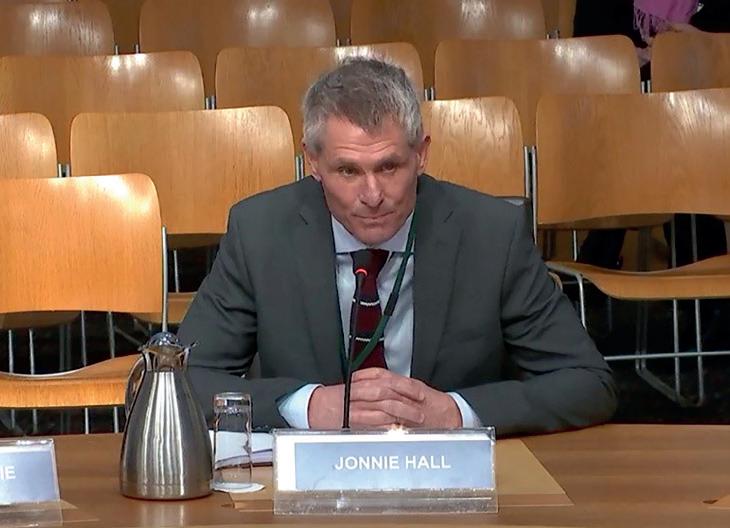
undertake EFA actions have a range of suitable and practical options delivering biodiversity and climate change benefits without compromising agronomic or enterprise performance. Redistributive payments or “front loading”, can ensure smaller units are not disproportionately impacted by additional scheme requirements or economies of scale. Providing an increased payment rate for the first tranche of hectares for all businesses supports both small and medium-
Our challenge now is making those commitments stick and that means every farm and croft receiving direct support making a clearer contribution to those explicit policy goals around food production, climate, nature and people.
and crofting in the uplands, islands, and remoter areas. In doing so help to safeguard biodiversity, carbon storage and rural populations.
Enhanced Greening can offer additional payments to the arable and intensive grassland sectors for the uptake of voluntary nature-based measures through Ecological Focus Areas (EFAs). However, a range of options must be available to ensure that all businesses required to
sized farms and crofts. In addition, redistribution payments would also promote new entrants into farming and crofting and negate the need for the capping or tapering of direct support payments. Furthermore, specific exemptions could remove some obligations to help protect smaller producers from disproportionate risks and costs, especially where socio-economic and environmental contributions are the primary concern.
Such exemptions could reduce regulatory and scheme-related costs, thereby encouraging participation.
In very simple terms, the structure of future direct support could see Tier 1 comprising new criteria for active farming and crofting, including both redistributive payments and small producers exemptions.
Tier 2 could consist of three complementary, and often overlapping, components: coupled support, less favoured areas support and enhanced greening.
As for funding, we have hard-won commitments from the Scottish Government that at least 70 per cent of the agricultural budget be allocated as direct support, 70 per cent initially allocated to Tier 1 with the remainder focused on Tier 2.
Our challenge now is making those commitments stick and that means every farm and croft receiving direct support making a clearer contribution to those explicit policy goals around food production, climate, nature and people.
A decisive shift from blunt, area-based payments to a more targeted, outcomedriven support system is critical.
We must prioritise active farming and crofting, reward environmental action and embed fairness and proportionality into future direct support. Only that will enable Scottish agriculture to thrive amid evolving climate, market and social challenges.












Lucy Sumsion
07787 434 104 lucy.sumsion@nfus.org.uk
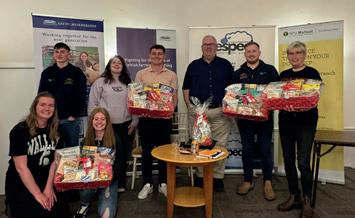
Kintyre members recently joined the Campbeltown Young Farmers in a successful quiz evening. Special thanks to local Councillor and farmer John Armour for being the quiz master and setting questions with a mix of general knowledge and some topical Kintyre farming knowledge!
The raffle held during the evening raised £142 for Farmstrong Scotland. NFU Mutual Oban, Campbeltown and Islay agency and the Kintyre Larder, provided hampers for the prize winners. All agreed it was a great night and were keen to host another event soon.




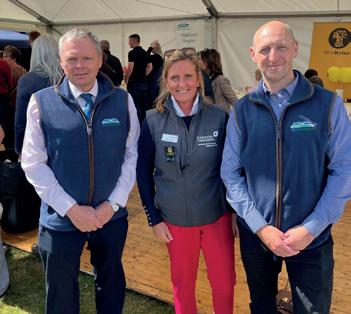
In early July, King Charles III made a memorable visit to Campbeltown, an event that was highly anticipated by the Kintyre community. The visit coincided with a special farmers market, scheduled specifically to allow the King to experience produce from the area firsthand.
At the market, the King had the pleasure of meeting various NFUS members from the Kintyre Branch, who showcased their exceptional produce. Among them were the Glenn family from Saddell Home Farm, displaying an array of items from Saddell Nurseries, and the Gemmill family from Ifferdale Farm, who fed visitors their home-reared lamb. Harry Gemmill also put on a sheep shearing
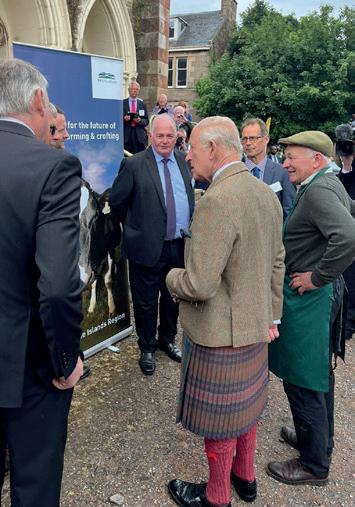
It has been great to have members of the presidential team at so many of the shows this season across the Highlands. Vice President Robert Neill tackled Caithness Show, Vice President Duncan Mccalister made it to Nairn before heading over the bridge to Skye, and President Andrew Connon was at the Black Isle Show and Grantown Show. The level of engagement with members and politicians was fantastic. The presence of the presential team and national board directors was the icing on the cake but the effort, time and expense that the group secretaries and their staff go to making sure these events run as smoothly as they do, has to be noted.
As we head towards the end of the of summer with politicians returning from recess, the Union has centred its future work around bringing common sense
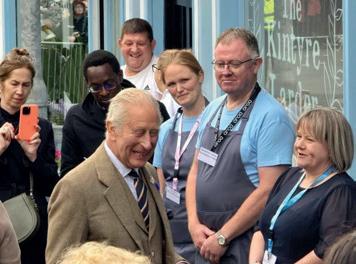
demonstration, which the King was suitable impressed by.
The King spoke with several members from the Kintyre Branch, including Branch Chair John Smith, Vice-chair Sandy Pirie and Group Secretary Chris Wasson. During their discussions, the King expressed a keen interest in the agricultural practices of the region and thanked members for their hard work and dedication to producing high-quality goods. He also met with Andrew Millar, Clare Soudan and Kathryn Semple from Campbeltown Young Farmers.
Continuing his tour, the King visited The Kintyre Larder, a local shop owned by Kintyre branch member Linda McLean. Here, he viewed the wide selection of local produce on sale and was presented with a beautifully curated hamper filled with local goodies, all hailing from the Argyll region.
The King’s visit to Campbeltown was a tremendous success and a wonderful opportunity to highlight the fantastic produce that the region has to offer, celebrating the efforts of its dedicated farming community.
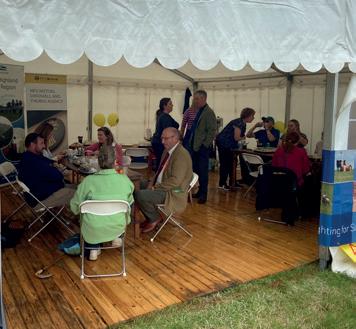
into the inheritance tax fiasco. The union has promised to continue trying to shape future support policy with the Scottish Government from 2028 and beyond. This was in addition to helping with the many other challenges our members face on a daily basis.




REGIONAL MANAGER
Lindsay Brown 07780 441 750
lindsay.brown@nfus.org.uk
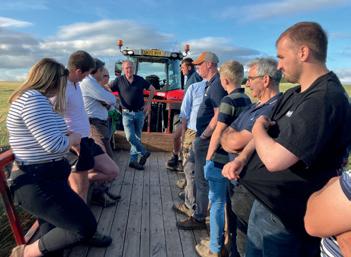
It was a beautiful evening at Smailholm Mains Farm in Kelso, when NFUS members visited for a BBQ and educational discussion.
Hosted by the Shaw family, the July visit was a chance for members to socialise and meet new-attendees. The family introduced the farm and described the management system in place before taking a tour around the farm. We particularly enjoyed seeing the Suffolk Tups, which the family is very proud of.
Adding to the day, we were delighted to hear from Scottish Agriulctural College (SAC)’s animal nutritionist Lorna Shaw, who shared her top tips on how to get the best from your livestock.
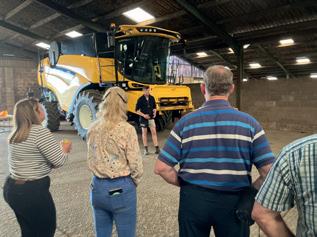
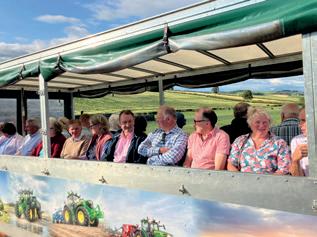
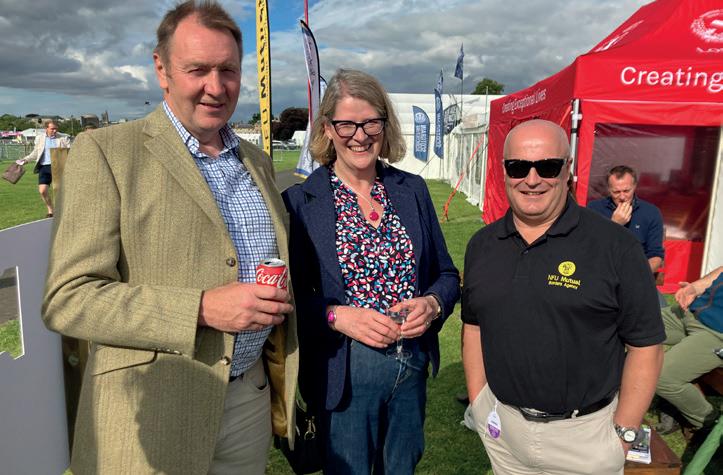
We had two good days at Border Union Show from the 24 to 25 July where we welcomed lots of members to the stand for refreshments and a seat.
On the Friday evening, the Kelso and St Boswells Branch held its social gathering with members and local councilors. Then on Saturday, NFU Scotland Vice President Robert Neill and CEO John Davidson joined us. The pair held meetings throughout the day with members and local parliamentarians, gaining lots of valuable engagement.


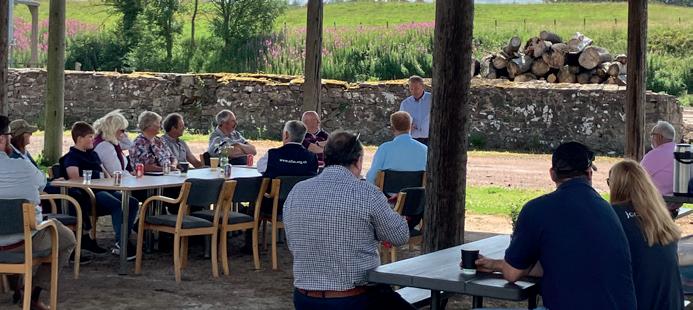
Midhope Castle on the Hopetoun Estate was the venue for the Lothian members’ Summer BBQ. At the event, Estate Manager Mike Eagers, shared insights into the farming operations across various parts of the estate.
Castle Manager James Gourley, also spoke about the history and heritage of the castle as well as the challenges of managing it as an extremely popular filming location for Outlander, with an ever-increasing number of visitors. We
were even lucky enough to go inside the castle and see some of the props and memorabilia from the show. A great day had by all!
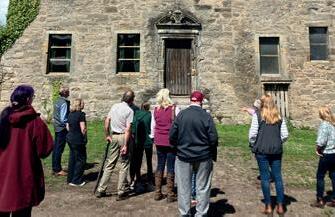
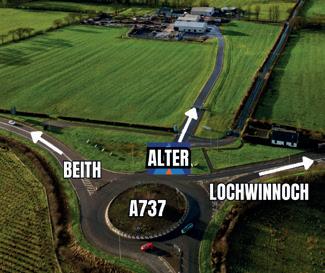



















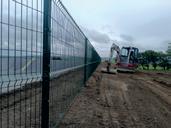









































































































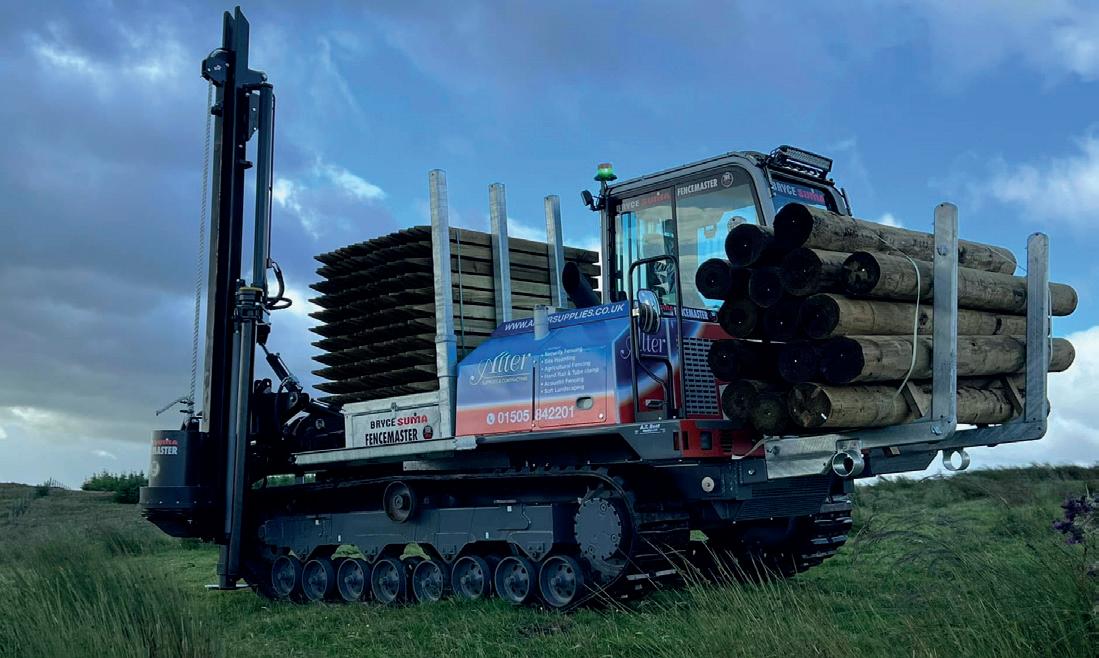
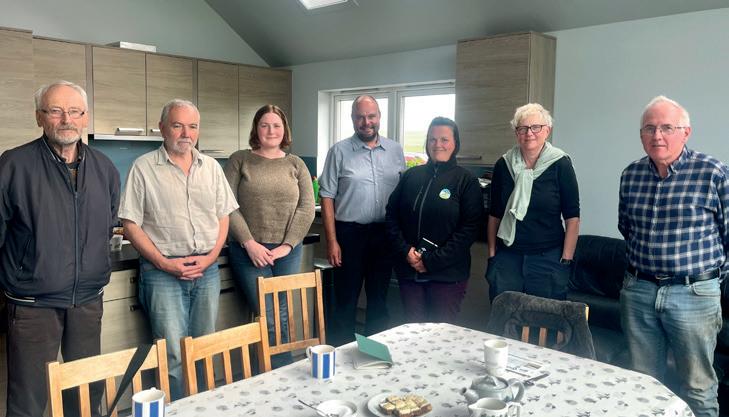


REGIONAL POLICY ADVISOR
Lee Smith


07554 741 030 lee.smith@nfus.org.uk
With reports of raven attacks increasing, NFUS Shetland recently held a meeting at Quendale Farm hosted by Hilary and Martin Burgess. Representatives from NatureScot were keen to meet members at the event and hear their experiences and concerns, first-hand.
Aside from NatureScot, representatives also included Scottish Government Rural Payments and Inspections Division (SGRPID) , RSPB Shetland, and Councillor
Allison Duncan. All of whom had a vested interest in Shetland’s raven population.
Discussions covered historical evidence and ongoing member concerns about raven activity, including the regional spread of raven populations across Shetland and their wider impact on other wildlife. We also looked at how the current licensing system could be improved, from making applications quicker and simpler, to allowing licences to cover entire farms or crofts instead of just individual parks or fields. There was strong support for exploring collective licences for neighbouring crofts or farms, provided there’s agreement in place between the crofters.
Over the coming weeks, NFU Scotland will be gathering more local data for NatureScot to strengthen the case for a regionalised raven licence in Shetland.




REGIONAL MANAGER
Holly Fitsimmons
07775 838 926 holly.fitzsimmons @nfus.org.uk
By Ayrshire member Cora Cooper
For sustainable food production to take centre stage in policy and decision-making, we need to be proactive in sharing our positive stories beyond the farm gate. Storytelling and real-life experiences of working with the land are among our strongest tools for engaging people who may never have set foot on a farm.
Recently, we had the pleasure of welcoming Cabinet Secretary for Rural Affairs, Land Reform and Islands Mairi Gougeon MSP to our farm as part of her summer tour. Ours was her final visit of the season, and she arrived full of praise and
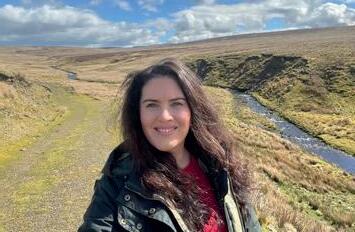
enthusiasm for the many farms and rural businesses she had already seen.
During our tour, we focused on demonstrating the benefits of keeping sheep on a designated site, where carefully managed grazing is actively enhancing biodiversity. It was a clear, practical example of how farming and environmental stewardship go hand in hand. Never underestimate the power of an on-farm experience as it creates a lasting impression that facts and figures alone often can’t match.
But this isn’t just about one visit. If we want to be considered in the
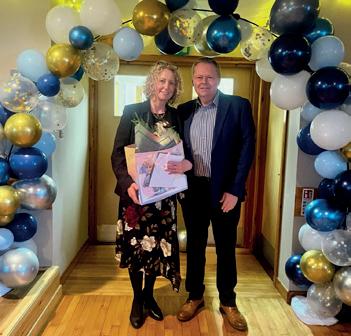
After 30 years of dedicated service, NFUS Shetland Group Secretary Margaret Leslie decided to hang up her secretary’s hat and enjoy a wellearned retirement. Over three decades, Margaret has been a tremendous source of knowledge and experience for our members and the feedback from across Shetland is unanimous, she will be greatly missed.
NFUS President Andrew Connon joined members in wishing her all the very best, presenting Margaret with flowers and gifts in recognition of her outstanding contribution. Congratulations, Margaret, we hope you enjoy every moment of your retirement!
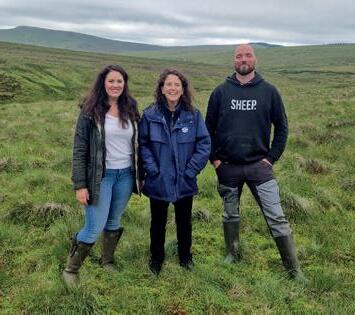
conversations taking place in rooms we’re not in, we need to make sure our stories are already known to the people sitting around those tables. Policymakers, retailers, community leaders, educators, and the public all play a role in shaping the future of Scottish farming — and they need to hear from us directly.
So I would strongly encourage every farmer, crofter and grower to highlight the positives we’re already delivering in sustainable food production. Show the biodiversity gains, the climate-friendly practices, the care for livestock and the land. Invite people onto farms, share your experiences in the media, talk at local events and don’t be shy about it.
In short: shout it from the shed roofs!




Mhairi Dawson
07718 425 053 mhairi.dawson@nfus.org.uk
o, we’re not talking about Trump, we are of course speaking about Andrew Connon. Andrew spent two days in Dumfries and Galloway in July and was able to speak to all four of our branches during his visit. Starting out with another successful Stranraer Show, Andrew met many members from both the Wigtownshire branch and those who travelled down from Ayrshire for the day. He then joined around 80 members at the Dumfries and Stewartry branches Farm Walk hosted by Caerlaverock Estates.
The following day, he headed out to visit members of the Dumfries and Langholm branches on farm, before finishing the day speaking to members at a Langholm branch meeting. Andrew discussed many topics that matter to members, most commonly inheritance tax,



species management, labour and skills shortages, and the threat from agricultural land abandonment and the knock-on effect to local, rural communities and supply chains. We thanked Andrew for his time listening to our concerns and for sharing his knowledge from the Union.
In similar vein to the US Presidential team diary, it was then the Vice President’s turn next to visit Dumfries and Galloway. We were delighted to have Vice President Robert Neill join us at Dumfries and
Wigtown shows last month. At each event, we had fantastic political engagement with councillors, MSPs and an MP. We also met many key stakeholders, friends and colleagues throughout the industry, all making for a brilliant few days.
We extended our thanks the Stranraer and Dumfries branch group secretaries and staff for their tremendous efforts in making the shows a success. We were also grateful to all members that took the time to visit our stand.
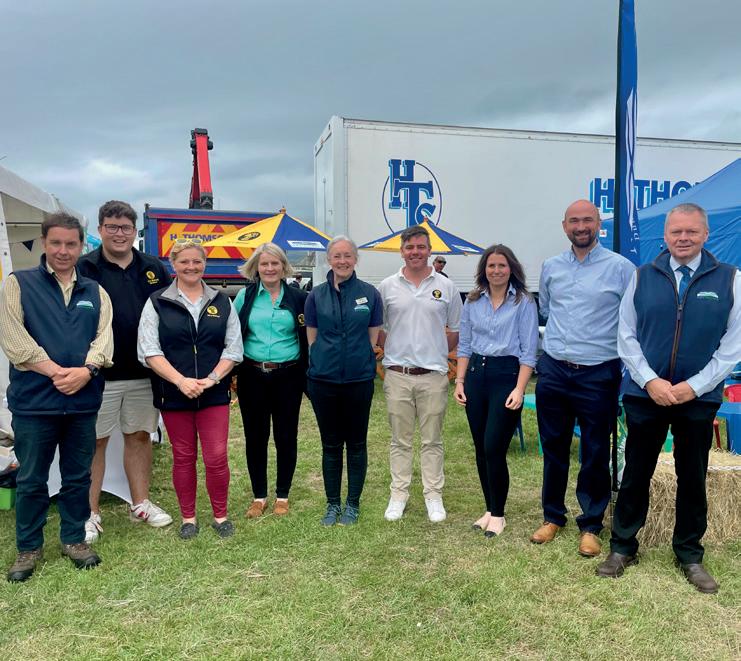
















"Winter barley is on the turn. Winter beans are unbelievable. Neighbour has some winter beans and they are going yellow and half the size of our Triton drilled beans. Quite amazing what the Triton has done here".
To attend a demonstration call 01223 891888
Triton UK
01223 891888
hello@tritonseeddrills.com Service Line: 01223 891888

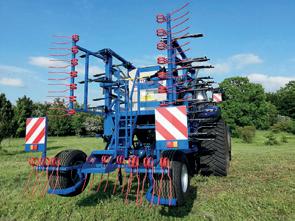

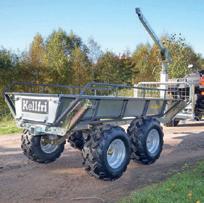
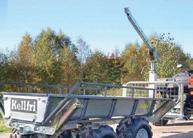
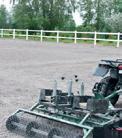
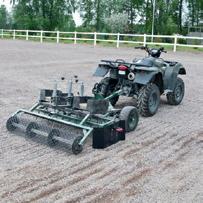


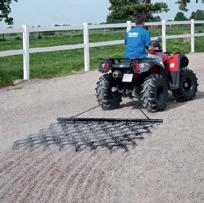

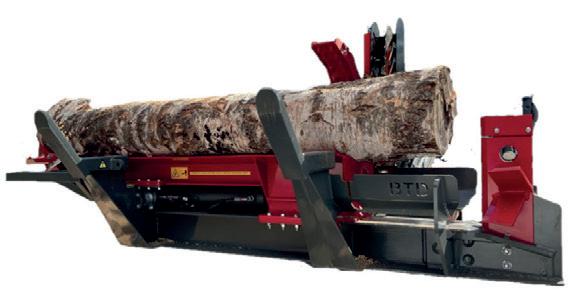




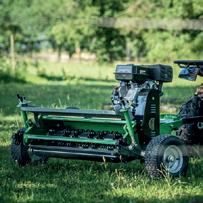
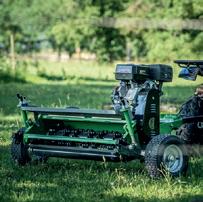






Lorna Paterson
07786 860 453
lorna.paterson@nfus.org.uk
It’s been a busy month with local shows up and down the country. We kicked things off in Fettercairn at the start of July, where the Laurencekirk Office team pulled out all the stops. Smashing banter, decent weather and quality refreshments kept our stand buzzing all day and left everyone ready for a wellearned rest at the close. We enjoyed good interactions with politicians, backed by strong support from President Andrew
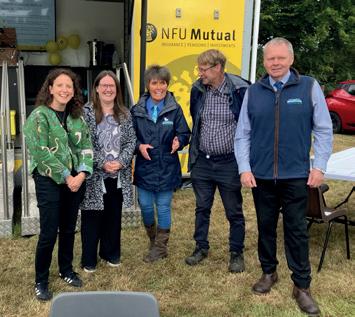
With the new Kintore to Teeling overhead electrical line, members welcomed the chance to discuss concerns with Vice President Duncan Macalister and Rural Business Policy Manager Rhianna Montgomery. The Union wants members impacted to stay informed and supported as planned infrastructure projects by power companies and off shore wind farms begin.
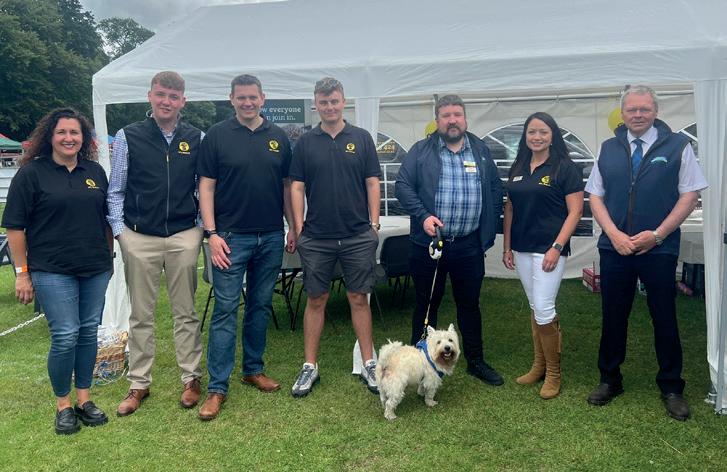
Connon and NFU Scotland’s Director of Member Sevices James Buchanan.
Next up was the New Deer Show, delivered with real dedication by the Keith and Turriff Offices. Our Politician and Councillors’ event drew a great turnout and lively discussion while the Branch Drinks Reception began just as the rain set in, so the marquee soon filled up and noise levels followed suit. The atmosphere was fantastic and our mini auction, with Andy
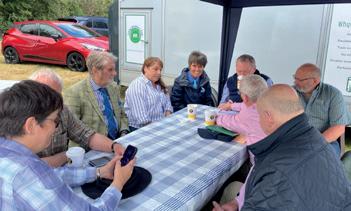
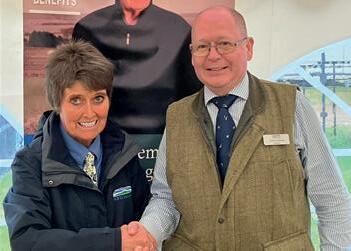
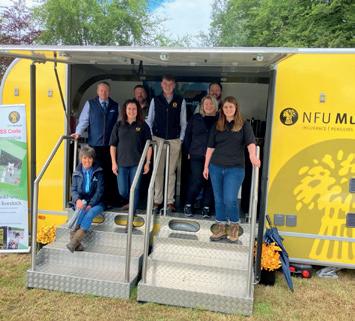
Ingram as “auctioneer extraordinaire,” raised £600 for branch funds. Thanks also to everyone who contributed to the auction and to anyone else who helped make the day a success.
Finally, the Banchory Show enjoyed glorious sunshine, with Thainstone and Laurencekirk offices co-hosting a prime marquee spot. Our local Group Secretaries put on a brilliant spread of food and refreshments for all visitors and we had valuable political engagement from Andrew Bowie MP and Alex Burnett MSP. We were also pleased to welcome President Andrew Connon to the event.
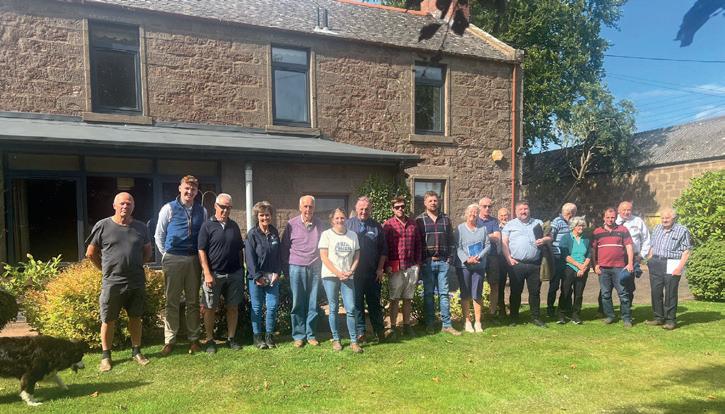

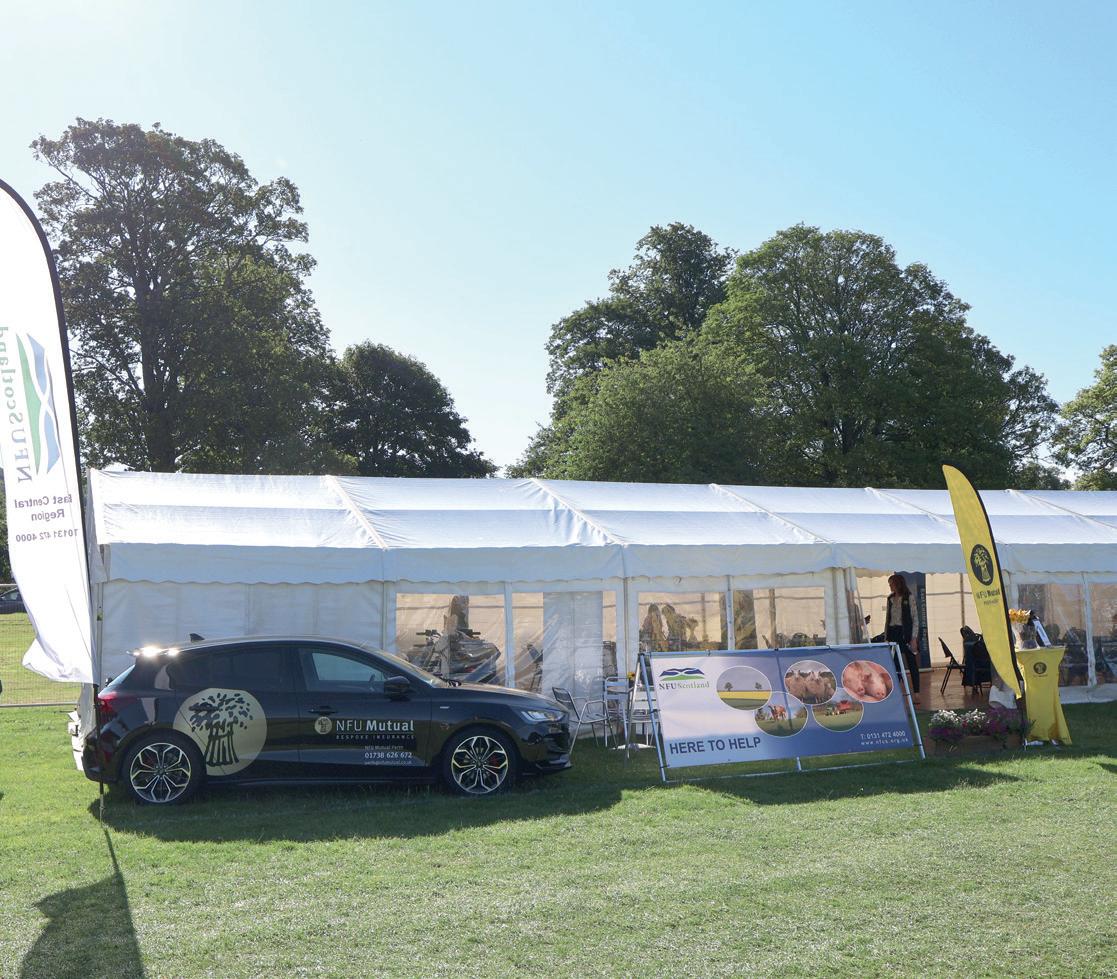




REGIONAL MANAGER
Kate Maitland
07919 001 23 kate.maitland@ nfus.org.uk
As another busy show season drew to a close, we congratulated our members who were involved in fantastic events across the region. The time and effort that went into preparing for such shows should not be underestimated. They were enjoyed by those close to the
Tractor Road Run raises over £2000 for farmersyoung
Hland and by those in the rural and sometimes urban communities.
Maxing the opportunity, NFUS used each event to engage with members and local politicians. The summer season was filled with notable conversation and exemplary showcasing of our industry.
ighland Perthshire Branch’s annual Tractor Road Run has raised over £2300 for the Scottish Association of Young Farmers Clubs (SAYFC).
Congregating at Wades Park in Aberfeldy with 35 tractors of all diff erent shapes and sizes, the money raised will go to SAYFC’s Big Build Project, aiming to raise funds to construct a new headquarters for the
organisation. It was fantastic to see so many locals in the park to support the drivers and enjoying the day. This year’s route saw the drivers heading to Glen Quaich via Kenmore stopping at the Courtyard before returning to Wades Park.
Our cincere thanks went to Mains of Taymouth Courtyard at Kenmore who kindly donated ice-creams for those taking part.
FORTH & CLYDE




REGIONAL MANAGER
Sheena Foster 07789 796 582
sheena.foster @nfus.org.uk
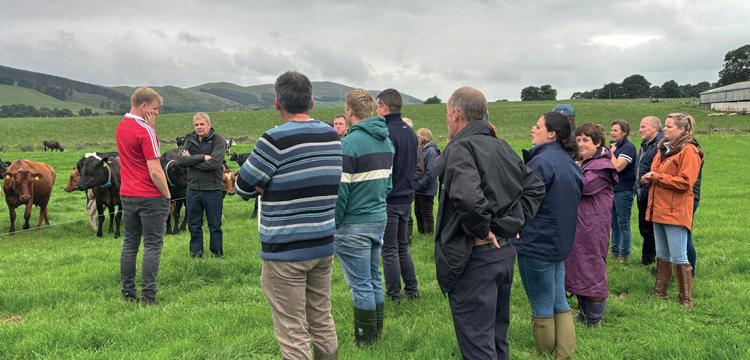

The Lanarkshire Partnership Against Rural Crime (LPARC) recently held a Strathclyde Park Fun Day for a day of education, entertainment and community engagement. In what proved to be a fantastic success, it drew in crowds and a wide range of partner agencies all providing valuable information and interactive. The event offered a great platform to highlight the ongoing work being done by the Union and others to tackle rural crime and promote responsible behaviour in the countryside.
NFU Scotland Forth and Clyde Region thanked Ayrshire Regional Manager Holly Fitzsimmons, who kindly covered the event. She was kept busy throughout the day speaking to dog owners about their responsibilities and encouraging responsible access when out, enjoying the countryside.
A special mention also went to Bryson Tractors, whose display was undoubtedly the most popular attraction of the day. Children flocked to the stand for the chance to sit in the driver’s seat of a real tractor, take photos and experience the thrill of being up close to big farm machinery. Their presence added a fun and memorable element to the event and was warmly received by families.
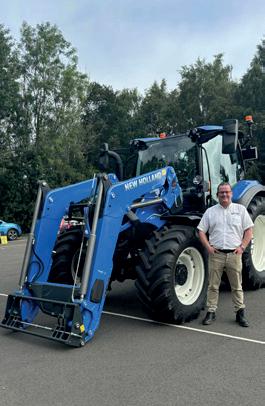
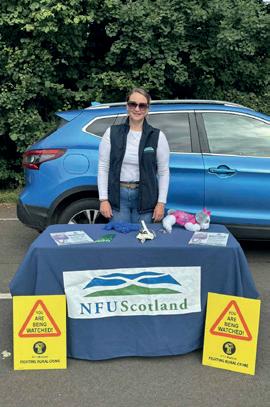
The Clydesdale branch of NFU Scotland held a wellattended and engaging farm walk at Eastfield Farm, Biggar. The event was kindly hosted by the Warnock family, who welcomed local members and guests for an informative and sociable gathering.
Attendees were treated to a tour of Eastfield’s operations, with the Warnocks sharing insight into their farming practices and developments milking VikingGoldenCross cows. The event proved an excellent opportunity for members to see daily challenges first-hand and innovations in the sector.
Adding to the evening’s value, NFUS Vice President Robert Neill joined the Walk and provided members with a detailed update on current NFUS activity. He touched on key issues affecting farmers and crofters locally and nationally, while welcoming questions from the group leading to a productive and open discussion.
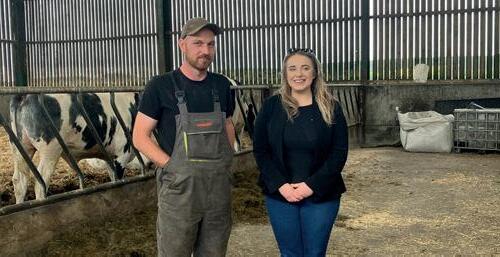
Falkirk Branch Chair Martin Denholm recently welcomed Megan Gallacher MSP on his Wester Lochdrum Farm for valuable discussion. The visit offered opportunity to look into the innovations driving modern farming and the ongoing challenges facing the sector.
Martin highlighted the forward-thinking approaches they’ve adopted on the farm, including improvements in livestock management, sustainable practices and the use of new technology. These developments demonstrated how the farm adapted to meet changing demands within the industry.
The conversation also touched on key issues affecting farmers today, including rising input costs, policy uncertainty and the need for continued support to ensure a thriving rural economy.
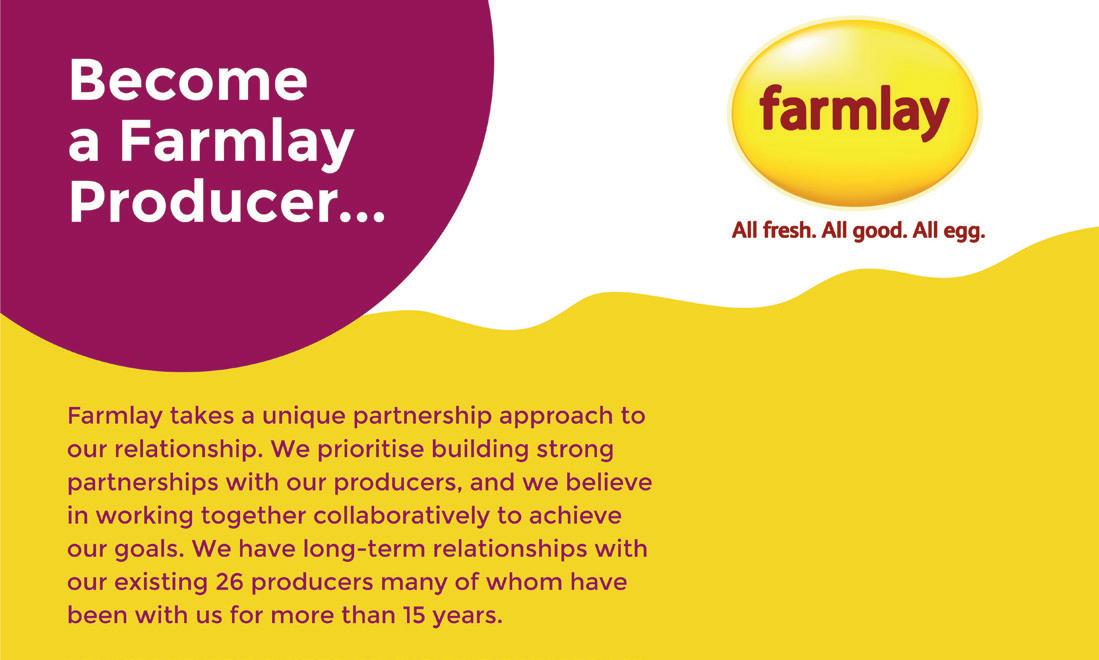
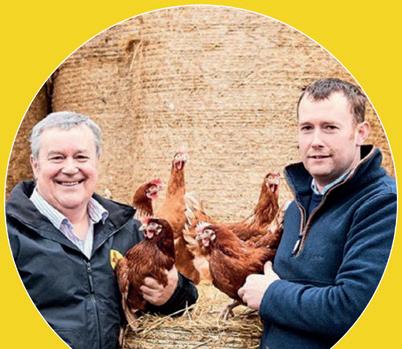


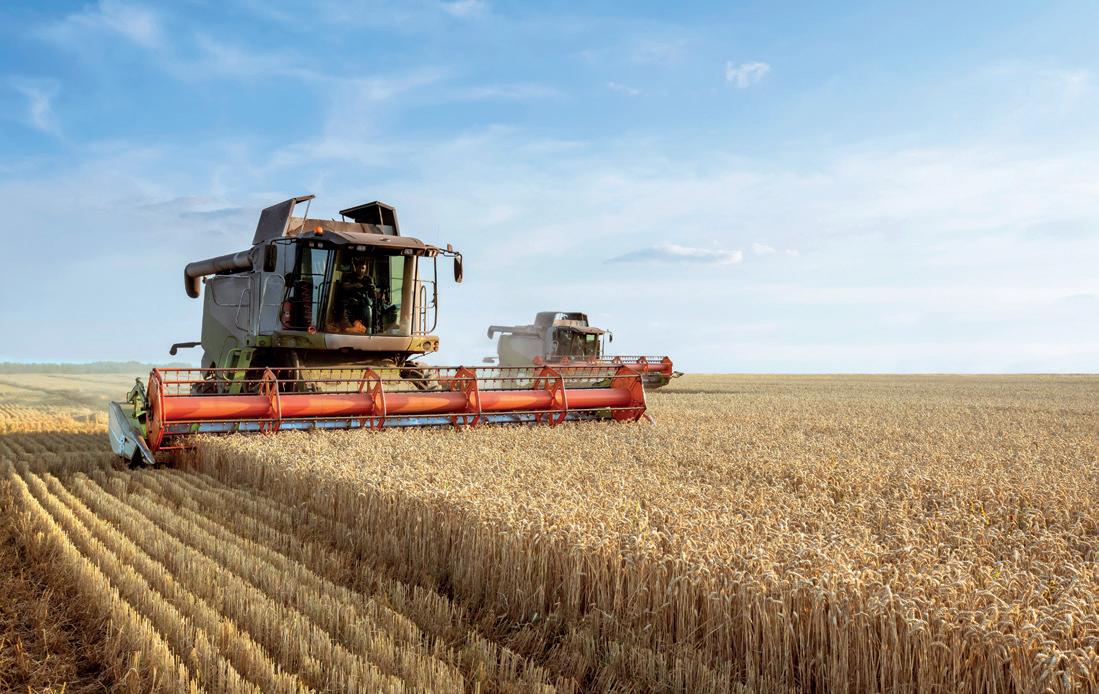
We work with farmers & agri-businesses year round to ensure farms, farm yards & homes are protected from break-ins, theft and damage
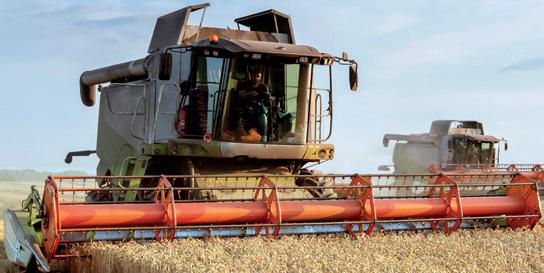


Full security vulnerability assessment
Cost effective solutions using what the farmers already have on site



Teaching how to conduct a Farm Security Assessment
Training of all staff, on farm security, Rural situational awareness and confrontation
Costs - Subject to negotiations




3 HOURS TRAINING
Farm Safety Training
Security Reminder & Workforce Security
Deterring Opportunity including Tips for Farmers
Farm Security Self-assessment

Rural Situational Awareness
Confidence in Confrontation
Costs - Subject to negotiations



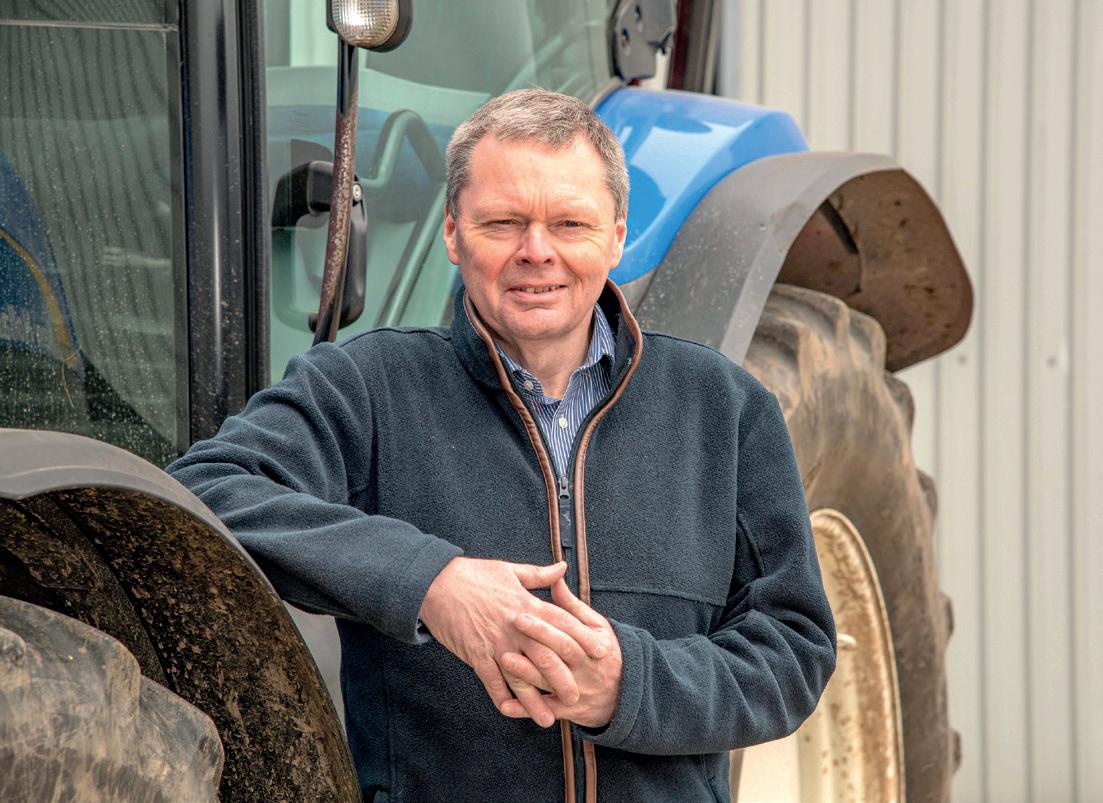
When President Andrew Connon was elected, he knew the role demanded energy, commitment and the ability to represent all of Scottish agriculture. With six months now under his belt, the scale of his schedule and the breadth of issues tackled told its own story.
Since his election, NFU Scotland has held over 150 meetings with key politicians from Holyrood and Westminster. Andrew has travelled the length and breadth of Scotland, across the UK, and at times, into Europe, all while ensuring that Scotland’s farming voice was heard where it matters most. Alongside Vice Presidents Duncan Macalister and Robert Neill, the Presidential Team have worked tirelessly, representing members on issues that will shape the future of Scottish agriculture.
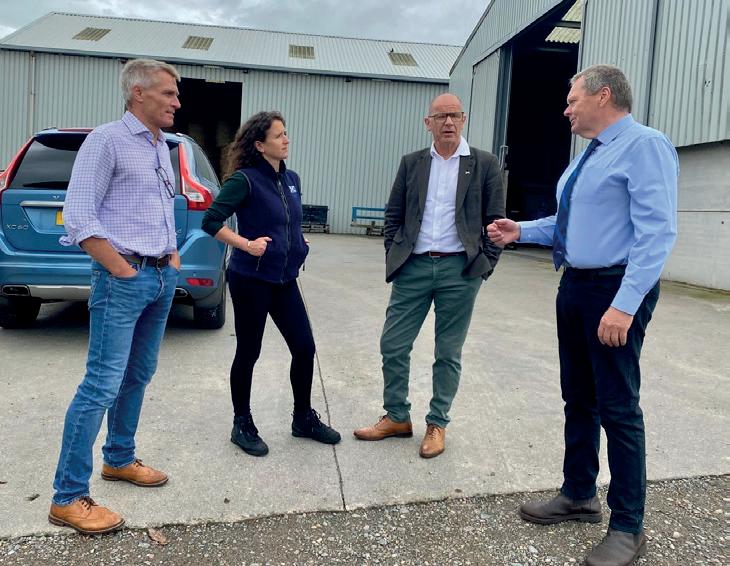

Andrew’s first six months have been defined by a packed programme of political engagement. Meetings with representatives from all political parties currently in Scottish Parliament and Scottish MPs in UK Parliament, have covered a diverse range of subjects from agricultural support and trade negotiations to climate targets, environmental regulation, supply chain fairness and of course, proposed changes to inheritance tax.
“Our whole mission statement at NFU Scotland is centred around securing a profitable and sustainable agricultural industry here in Scotland,” Andrew explained. “Getting that is down to effective lobbying with politicians and governments but also with key industry stakeholders. We want to get them to understand our sector so we can ensure a profitable industry going forward that delivers on so much over and above food production.”
Since his election, NFU Scotland has secured a number of wins for Scottish agriculture that were aided by the Presidential Team’s political engagement. To name only a few, the UK Parliament’s Environment, Food and Rural Affairs Committee backed our calls for changes to inheritance tax to be halted, the proposed Galloway National Park was scrapped and Scottish Government rejected recommendations made by the Climate Change Committee to cut livestock numbers in aid of climate change mitigation. To name only a few, the UK Parliament’s Environment, Food and Rural Affairs Committee backed our calls for changes to inheritance tax to be halted, the proposed Galloway National Park was scrapped and Scottish Government rejected recommendations made by the Climate Change Committee to cut livestock numbers in aid of reducing carbon emissions.
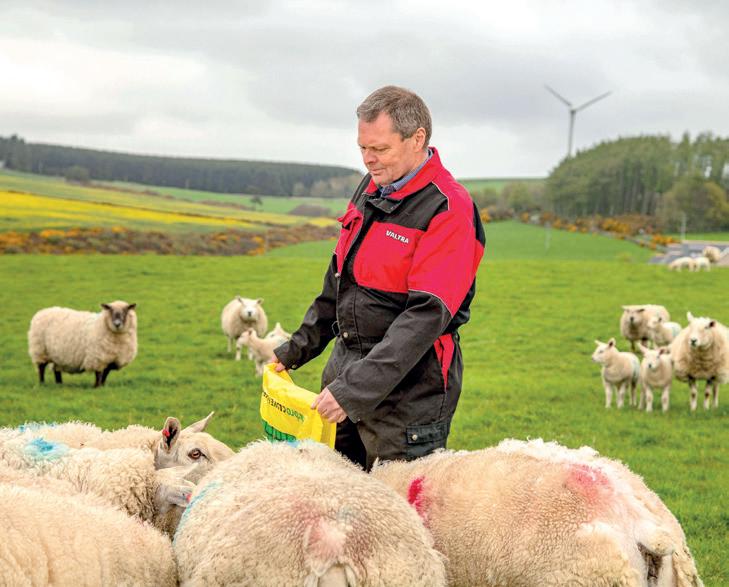
With many miles covered in trips to Edinburgh, London and Brussels since February, Andrew’s commitment to voicing the concerns of Scotland’s farmers and crofters has never faltered. The team’s diary has been full of farm visits, agricultural shows, regional meetings and conferences.
Andrew has travelled from Shetland to Stranraer, meeting members from all commodities on his way. “This is a people industry,” he said reflecting on his engagement with members in the past six months. “Without people, without relationship building, without engagement, we’ve got nothing. We’ve got so much knowledge in our industry from young folk right up to the older generation and while we’ve come through some tough times over the years, agriculture sticks in.”
He has always prioritised member engagement as a tool to harvest information about what is happening on the ground. When asked of what he does in his free time, he half-jokingly replied: “my family would say I have no free time!”
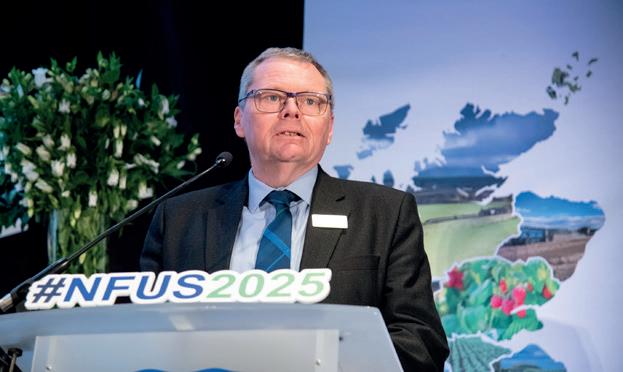
The first half-year has also seen the Presidential Team front NFU Scotland’s major campaigns. The ShelfWatch initiative, launched to monitor and improve supermarket sourcing of Scottish produce, gained traction with retailers and policymakers alike. Andrew personally presented awards to top-performing retailers and used the findings to push for stronger commitments to local sourcing.
Alongside his many ministerial meetings, Andrew has also tallied many individual meetings with key stakeholders since his February election. He added: “Within the role, I want to widen our engagement with all industry stakeholders. It is essential to have more joint-up thinking, that extends also to those in the supply chain and retailers.
“We are a people industry and we need to build that people element going forward.”
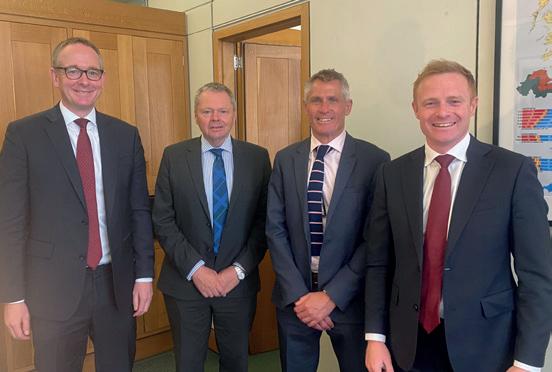
The Presidential Team have held farm visits in high regard since the start of their tenure. In July, the Connon family hosted Cabinet Secretary for Rural Affairs, Land Reform and Islands Mairi Gougeon MSP and Minister for Agriculture and Connectivity Jim Fairlie MSP, on their home farm near Aberdeen. Andrew enjoyed the opportunity to showcase his land to the Ministers with help from his wife Pauline, daughter Sarah and son Andrew Jr. It was the perfect opportunity to emphasise the pressures of running a family farm and the need for secured future funding.
Writing of the visit in his monthly Press and Journal column, he said: “It was good to get them up to the North East for a change of scenery and see the farm my family and I work on. From the Hill of Skilmafilly, I highlighted a 360-degree view of productive agriculture across the North East, wind turbines in the background. I stressed the amount of nature, woodland and biodiversity stitched around intensive farming, and how essential it is to have a viable agricultural industry if we are to deliver on Government’s biodiversity and nature ambitions.”
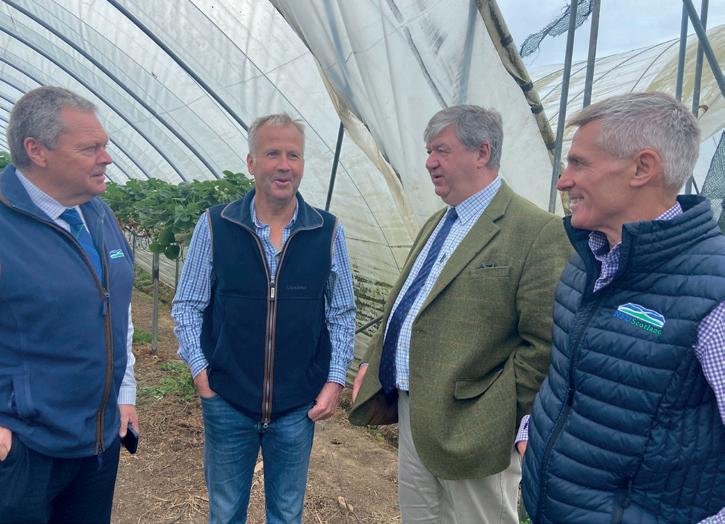
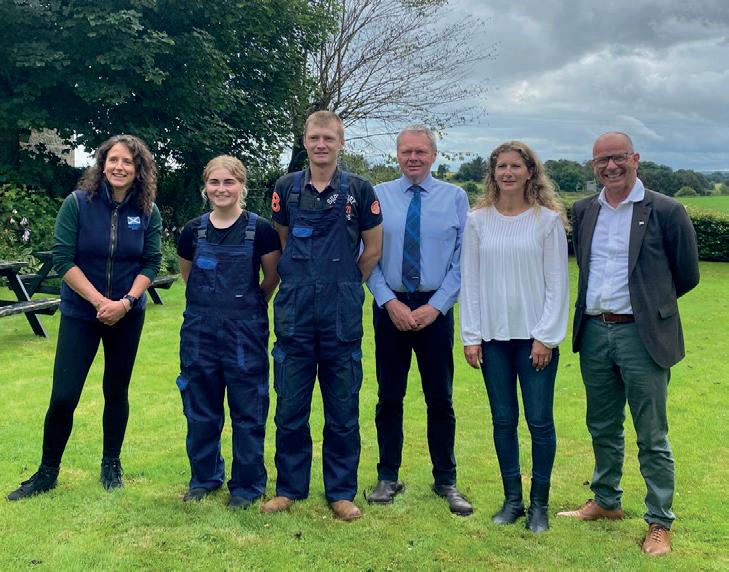
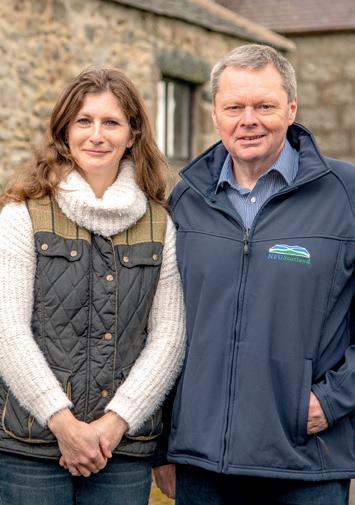
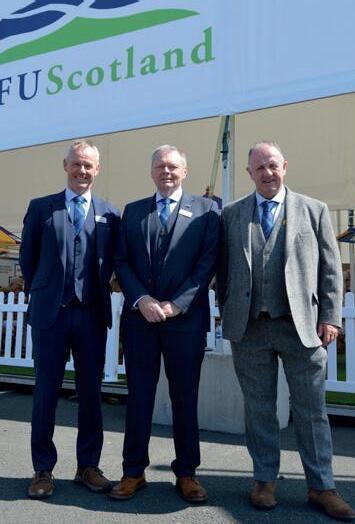
As the second half of the Presidential Team’s first year began, Andrew made his priorities clear: “My ambition within the role of President is to see a sustainable and profitable future for our industry. That is essential. We can deliver on so many things if we secure that sustainability and profitability.”
He was equally committed to increasing NFU Scotland’s prominence in media, stakeholder conversation and parliamentary discussion. The team also promised to continue working closely with our counterparts in UK Farming Unions as joint action has strengthened our voice on Westminster-led issues.
As the next six months unfold, Andrew stressed that the Presidential Team would remain firmly on the front foot, advocating, challenging and championing Scottish agriculture at every opportunity.
